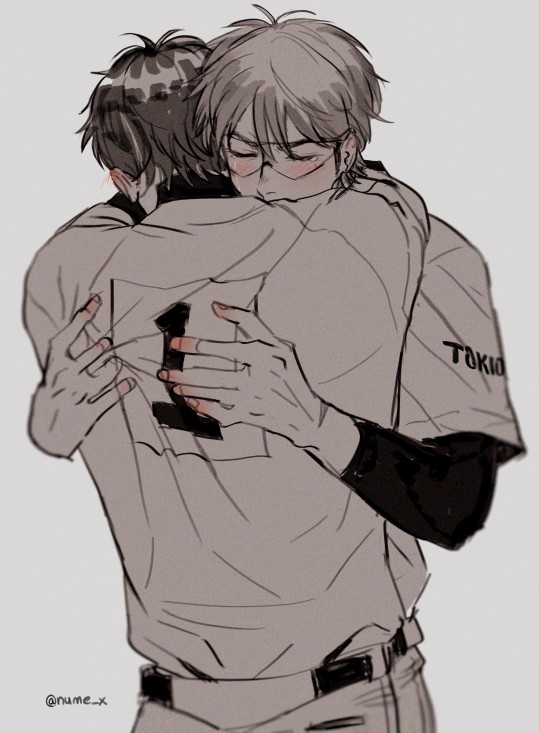Text
A Quick Evolution: Uruha & Hakuri Edition
Chapter 81: "ハクリ君/Hakuri-kun" (normal, expected, what he's been using all along)

Start of chapter 88: "ハクリ/Hakuri" (familiar, casual, close)

End of chapter 88: "はくりん/Hakurin" (cutesy, extremely casual, this is a nickname a girl could easily have)

I can't wait to see Chihiro's expression when he finally shows up and hears Hakuri being called the JP equivalent of "Hakkie" or some other ridiculous cute variant lmao. Please, Hokazono, let us see him react to that! And thank you Kiri for starting it!
79 notes
·
View notes
Text
Mydei: Legend, Reality, Agency

A while back on Twitter, I saw an excellent thread going around about how so many in-game sources of information on Mydei tell his story as if recounting an ancient myth, an unreal epic tale of a fictional hero, rather than a "real," existing being. (I wish I could find the thread again but unfortunately I only liked instead of bookmarked it, and it's disappeared in the ocean of likes now. T_T Maybe someone else knows it so I can add a link?)
Reiterating the point of that original Twitter thread: Unlike the other Chrysos Heirs, whose stories get treated as contemporary "real" events or whose tales are told through their own perspectives, almost everything we know about Mydei is framed through the filter of third party observers, resulting in a character that feels less like a person than a myth made flesh. Mydei's story doesn't come across as the coherent timeline of someone telling us true events--it feels like a jumbled, highly exaggerated account that might spread as rumors through word-of-mouth, or, more accurately:
It feels like storytelling.
The way Mydei's backstory and all of the sources of information we have on Mydei in-game unfurl in contradictory and overwrought manners has the ring of a legend passed down through generations, losing and gaining details over time, being misremembered, aggrandized, and taken out of context, until the heroic figure at the core of the story no longer has a human identity but has transcended to become a mythological figure, real history fading into romanticized narrative.
Mydei isn't a living, breathing "person," he's the untouchable "king of kings," the "greatest conqueror, the mightiest protector."

Overall, this storytelling effect is very apparent, in virtually every source of information we have about Mydei throughout the game:
Mydei's character stories are all third party accounts of his actions and past:

Phrases such as "legends state," "rumors swirl," "the author boldly speculates" etc. abound in Mydei's character stories, making it clear that all of the information contained in them is suspect at best--these are others' perceptions of him and the events of his life, not his own perspectives on what occurred.
Unlike virtually every other character in the game, instead of Mydei's character stories being a chance for players to get to understand Mydei's inner world, to see him from his own perspective, we're given this strange distance, these observations from "outsiders" who clearly fail to grasp who Mydeimos is as a person or real his motivations. In one character story, Mydei's own advisors struggle with their complete lack of understanding, questioning his decisions and rewriting his actions as being "bewitched" by Aglaea and the Flame-Chase Journey, instead of genuinely committed to the cause:

There's even confusion and speculation among fans about who wrote the handwritten notes at the end of each of Mydei's character stories. Are these Mydei's notes, answering the accusations, setting the records straight, and adding his own personal perspectives at last?
While I'm still somewhat inclined to say these are Mydei's notes, the fact that these notes are supposedly from books "in the archive of the Library of Garbaniphoro"--a library this lifetime's Mydei shouldn't actually have had any access to--definitely complicates that reading, not to mention that Mydei doesn't seem to demonstrate the level of self-interest that would drive him to look up and read a bunch of books about himself in the first place...
The fact that we fans can't even fully tell whether these notes were actually written by Mydei or by someone else--such as Khaslana, seeking accounts and histories of the person he cared for, trying to set the record straight even in timelines where his blade would eventually spell the end of Mydei's life--is just another hallmark of the confusion surrounding Mydei's life. In practically every moment, we're still not sure if Mydei is speaking for himself or not.
Mydei's chapters in "As I've Written" continue this exact same trend, giving accounts of his life through third party observations, rumors, and questions:

"They say," "others guessed," "rumors rife," a "wild tale," and literally "the protagonist"--this isn't a first person account of Mydei's backstory, his own thoughts on his situation, or his true life's timeline. It's a dramatized retelling of events through the lens of outsiders looking in, turning a "person" into a "protagonist," making him a fictional character in his own life (this is very meta, by the way).
The mission and journal text throughout Amphoreus's plot, even all the way from 3.1, also echo this, with second person point of view instead of first person, emphasizing Mydei's title as if that were more important than his personhood, and dictating his feelings as if they're "absurd," not earned or valid, while mission text in 3.4 paints Mydei as a completely overblown figure, a larger-than-life myth:

Even NPCs, particularly the Kremnoans, often speak of Mydei in this way, as if he was not a person but a figurehead, a symbol they are rallying behind, rather than a human being with challenges, hesitations, and thoughts of his own:

The end result of all of this together is that Mydei comes across much more like a fictitious character than nearly any of the other Chrysos Heirs. Is he a lingering hero of the Chrysos War one thousand years in the past? Is he the re-embodiment of the spirit of Kremnos itself, son of both "Queen Gorgo" and "Gorgo, the Founder of Kremnos," as the game so likes to conflate? Is he a conquering tyrant, the king of kings, an embodiment of the sea, the Guardian of Amphoreus, the beloved crown prince of his country or the patricidal traitor?
Even in the meta sense, we players struggle to separate fact from fiction, leading to the sensation that all along, Mydei's single "story" has actually been multiple stories, at least two different timelines interweaving into a jumbled, incoherent past full of made-up events that couldn't have occurred, contradictions, and out-of-context plot points coloring even the player's perceptions of Mydei and his past.
And all of this, I think, is very intentional.
If you were to ask me "What's is Mydei's real role in Amphoreus's story?" I think the best answer to that question is: Mydei's role in the story is a commentary on the nature of storytelling itself.
The theme of storytelling is essential to Amphoreus's plot, with the "As I've Written" text being treated as the core model for each character's memory-identity that the Trailblazer is inscribing and bringing with them into the past (and therefore also the future) of Amphoreus. The idea of storytelling and narrative is so central to Amphoreus that the entire plot effectively revolves around it: The Flame-Chase Journey, and therefore the entire core reveal of Amphoreus being a simulation instead of a real world, is tied to Plato's allegory of the cave, itself a story about people who believe facsimile (their shadows cast by flame on the cave wall) is reality--in other words, a moral about mistaking narrative for truth.
It is only by rejecting the false reality--breaking free of Irontomb's simulation--that Amphoreus's people can become "real," escaping the digital unreality to enter the actual universe. In essence:
It is only by escaping "fiction" that one can embrace "true" existence.
But there's a second layer of the moral quandary: If the fiction is more beautiful, more entertaining, and more glorious than reality, would it be better to stay in the story, to turn your back on reality and just be the heroic protagonist of a fairy tale epic?
The game itself asks us to confront this idea:

"Do you care how true a memory is?"
Mydei is a walking, talking manifestation of this exact theme. Are we actually supposed to care how accurate his backstory is?
If Mydei is just meant to be a narrative symbol of kingship, of guardianship, of Strife, then does it really matter if things about his past do not add up?
If Mydei is a pure stand-in for the concept of "the mythological hero," do we really need his timeline to make sense?
Is an aggrandized, dramatized recounting of his past and deeds not perfectly in keeping with the way every mythological hero's past is told?
Consider our real world heroes of yore--Beowulf, Odysseus, Gilgamesh--do any of them feel "real"? Do we think of them as actual historical figures who lived and died like we do, or are they larger-than-life heroes whose actions are all so fictionalized and exaggerated that they never could have happened in real life? Do we understand our heroes as sentient, three-dimensional existences? Do we know their thoughts, their feelings, their struggles outside the narrow confines of their legends?
Or do they exist just to be morals, role models, symbols?
In fact, there is evidence suggesting that many mythological figures like Gilgamesh and Beowulf were real kings who actually lived in our real world--but we will never know the true stories of those men, because their truth has been entirely consumed by narrative.
Fiction eclipses fact.
We take the shadows on the wall to be "truth," and never see the real world beyond the cave.
Mydei's story is a microcosm for what is happening in Amphoreus's plot as a whole, a concentrated example of what occurs when memory becomes "blurry or gets idealized."
It's a pointed commentary on the nature of storytelling, because you never tell the exact same story twice. Over time, as you recall the tale, it changes, minute details being washed away in favor of remembered generalizations, hyperbole, and shifting interests. Every person who retells the story, every new perspective on the original material, brings their own agenda to the table, further altering the original until it barely resembles what really occurred.
As Trailblazer and Co. struggle with the question of how to make Amphoreus real from the memories we have gathered--and whether we want to recreate the world accurately or pen a different, much happier ending--we see that same struggle play out in miniature through Mydei, whose true life and true voice are being subsumed in before our very eyes by myth, by legend, by others turning him into a convenient symbol or source for their own speculation.
Through Mydei, we see the dangers of what can happen when memory becomes "beautified," capturing fiction rather than truth.
But more than its reflection on his overall role in the story, I think there's a fascinating side effect of choosing the concept of "storytelling" as Mydei's central theme: Writing him as a character whose real thoughts and feelings are eclipsed by other people's perspectives puts Mydei in a position normally occupied by female characters in media--the position of having to fight for agency.
(Before I go any further with this point, because the Star Rail fandom has literacy issues, let me doubly clarify: I am not talking about the experiences of actual real world women here [although they do often reflect fictional women's experiences]--I am talking strictly about the roles and struggles stereotypically assigned to female characters in media. If you can't keep that context in mind, stop reading here, because I don't want to deal with pancakes-and-waffles people who think saying "Media frames X as a feminine trait" is equivalent to saying "Real people can't be feminine if they don't experience X." PLEASE.)
Okay, with that out of the way, what I mean is this:
One of the most common experiences of female characters in media, especially in media written primarily by men, is being unable to speak for themselves. The stories of female characters are often told almost exclusively through the lens of their male protagonist counterparts, and female characters are often given less interiority. Even in cases where female characters are able to express their own individual thoughts and feelings, those thoughts and feelings are often dismissed in favor of others' interpretations. ("Oh, so you actually mean ____" or "You don't really feel that way.")
Because Mydei is a character whose role in the story is defined by his truth being eclipsed under mythology (his actual thoughts and feelings hidden behind the game sharing only the perspectives of outsiders), he also effectively becomes a character who does not speak for himself, willingly or not.
Obviously Mydei's character stories are perfect proof of this, locking us out of his own inner world by giving us almost entirely the views of others, one of whom even rejects the very notion that Mydei could be exactly who he is, saying "There's no way such a person could exist," no way this would be real behavior, no way Mydei could be an altruistic and kind person:

The "As I've Written" chapters double-down on this notion, stating multiple times that Mydei is "a man of few words" who rarely conveys his thoughts on any matter. He is repeatedly described as "going silent." Worse, even when he does convey his thoughts, others find his words to be "absurd" and abandon him:

Hell, even Mydei's marketing materials get in on this impression:

But this trend towards silence happens outside of Mydei's written materials too. Over and over again, the game puts Mydei into positions where other people tell him how he should be thinking or feeling. It isn't that other people are always wrong about Mydei's feelings, but that the game consistently frames Mydei's emotions through other characters, rarely letting him be the one to express himself.
It happens with Krateros numerous times, but most clearly in the memory fragment after Mydei kills his father, where Krateros literally tries to tell Mydei what he's supposed to be feeling and how he should react to what just happened:

It occurs with the Chrysos Heirs several times, such as Tribbie telling Mydei how he should feel after Phainon's failed trial (no, I'm not blaming Tribbie here; she didn't do this maliciously):

We even see this happen with Phainon, who ends up interpreting Mydei's feelings on Mydei's behalf:

There's actually a running joke throughout 3.0, 3.1, and Mydei's "As I've Written" about other people (read as: Phainon) acting as historian in Mydei's stead, to speak about his past on Mydei's behalf, instead of Mydei sharing his own perspective on Kremnos's culture:

In 3.1, we get to see a Mydei who struggles to articulate his own thoughts and find the "right' words, and a Mydei who is keenly aware of the many times his thoughts fall of deaf ears, when his words fail to move the people he truly needs to persuade:

And nowhere do I think this futility in speaking for himself is clearer than in Mydei's highly symbolic relationship with language itself. It's no accident that Mydei "rarely speaks his native tongue" and the Kremnoan dictionary is jokingly referred to as "blank":

Since Mydei is synonymous with Kremnos, we can say that the game's refusal to let him speak much Kremnoan--and the game's refusal to let the Kremnoan language speak for itself--is equivalent to Mydei's inability to express his "true" self on his own terms. The emptiness of the Kremnoan language, though played as a joke, also effectively mirrors Mydei's silence as a character. Just as Mydei does not embrace his native language, he's not comfortably able to express the things he wants to say as a whole.
But how are we actually supposed to interpret this silence?
Is Mydei being spoken over or is he just choosing not to speak? Is this solely a case of Mydei making the mature decision not to respond to others' provocations, not to lower himself to deny false accusations? Does he just want to keep all his feelings hidden deep down?
I think you could easily interpret Mydei's constant returns to silence, interpret the game's decision to have all of his story told through others, as an example of classic "manly" stoicism, a male character simply refusing to be vulnerable or speak his true thoughts or feelings out loud. Maybe we could argue that Mydei simply doesn't see the point in telling the truth about himself, because he knows people will invent their own stories anyway.
But... to be honest, I think the framing is a little different with Mydei. He's not actually that stoic or detached from his feelings. In fact, he's frequently rather candid about his emotions, significantly more so than Amphoreus's other primary male characters, Phainon and Anaxa. Although he rarely speaks his own inner thoughts, Mydei readily tells others (namely Phainon) to stop trying to hide their emotions, and in 3.1, he does actually try repeatedly to share his personal concerns, frustrated by the irony that his own language supposedly doesn't even have words for the things he's feeling.
While he is certainly reserved, Mydei does not seem to ascribe to the toxic idea that men should never express their feelings, and he doesn't aggressively hold his cards close to his chest. I don't get the impression that Mydei wants his life to be eclipsed by rumors and others' distorted, biased perspectives--I don't think he really wants to be silent.
In fact, in several moments across 3.0 and 3.1, Mydei tries quite hard to articulate his true wishes and thoughts... only for others to talk over and dismiss what he is saying.
We see this happen even all the way back when Mydei was a child, trying to express his dreams:

As a joke, this happens during 3.0 with Phainon, who "translates" Mydei's lofty way of speaking for the Trailblazer into different (inaccurate) words during their journey through Kremnos, even at one point going "Yeah, to be honest I have no idea what Mydei's trying to say either. Let's just move on."
We see it happen in 3.1 with Aglaea, who (for her own valid reasons) refuses to acknowledge Mydei's feelings about the coreflame of Strife, writing his reservations and fears off as "foolhardiness and indecision."
We see this happen even with Chartonus, who questions why someone like Mydei would be "terrified" of fulfilling his destiny, only for Mydei to struggle to explain the depths of his fear of losing himself to Strife.
"Why wouldn't I be terrified?" he says in 3.1, only for literally everyone to ignore him.
We see this happen with Krateros and the Kremnoan elders, who both explicitly scold Mydei for acting like a submissive (read as: stereotypical impression of femininity) prey animal instead of an dominant (read as: stereotypical impression of masculinity) predator.

I've written about this elsewhere, but this is the direct rhetoric that feeds into Mydei's "As I've Written" story based on the proverb "Until the lion has its own historian, the history of the hunt will always glorify the hunter." This proverb directly targets the duplicitous nature of storytelling, where one side of the story often gets told and the other is forgotten--clearly intertwined with Mydei's case, where the truth of his story goes untold in favor of the other side's perspective, where predator and prey are switched, and the lion becomes the victim, not the victor.
In fact, Mydei taking this supposedly "prey" role (serving another's cause, where his wishes are a distant second to the wishes of others), becomes one of Eurypon's foremost complaints when Mydei is confronted by his father's ghost: Mydei is the kind of person to quietly support others (a role stereotypically given to female characters), which flies directly in the face of Eurypon's near constant attempts to project himself and his own violent, "kingly" emotions onto Mydei.

So, all together: A character whose actual feelings are dismissed, downplayed as too emotional and not befitting his station, who finds his words falling on deaf ears, who is perpetually projected upon by the men in his life, and is constantly having his thoughts interpreted by others on his behalf instead of getting to be his own "voice"?
It's literally the quintessential fight of female characters across centuries of storytelling, and Hoyo deciding to assign this conflict to what initially appears to be one of their most stereotypically masculine figures in the entire game is fascinating, because it changes what is otherwise a cut-and-dry story of the prodigal son refusing to carry on his father's legacy into a significantly more complex, gendered reading: What if the son is not intuitively an aggressive, commanding man, but someone who struggles to articulate himself, who despite being able to carry the banner of leadership whenever he must, actually seeks the quiet, supportive role for himself when given the freedom to do so?
When people say that they were pleasantly surprised by Mydei's charcter because he wasn't the macho brute they were expecting him to be, I think what they are actually perceiving is this, the incredible dichotomy of taking the most classic masculine story of all time--son surpassing his father, prince becoming king--and assigning it to a character whose central emotional conflict is, historically, feminine. This is cool! This is really, really unique and cool!
But if all that isn't enough to convince you that Hoyo is doing crazy interesting (and surprisingly gender-nonconforming) things with Mydei's role in Amphoreus's story, then that's fine, because I haven't even actually gotten to the wildest part:
Setting aside entirely whether Mydei is able to speak for himself, the game deliberately and constantly goes out of its way to put Mydei into situations where he has no say in the things that are happening to him, once again assigning Mydei a conflict typically given to female characters across centuries of storytelling: the quest to gain agency.
Despite the game initially framing Mydei as powerful leader and strong decision-maker who could never be swayed by others, a warrior who would fight against fate with his very life on the line, drilling down into his story reveals a character who has effectively had no control over the course of his life at any given point in time, both in a conscious sense and in the meta sense of being a simulation in Irontomb's loops.

From the time of his birth, a prophecy dictated the entire course of Mydei's early life, setting his path in stone in a way that he seemingly couldn't have avoided even if he wanted to. He's thrown into the sea, left with no choice but to fight every day for survival--but even inside the sea, despite actively saving fishermen, Mydei never saves himself, simply staying in the ocean he supposedly despises until... what? He achieves a level of power sufficient to fulfill his future prophecy? 🤔 Later, Mydei will go on to describe his destined clash with his father as merely an "obligation to be carried out"--not something that ultimately made him happy or felt like a choice he was making of his own free will, but a moral duty to avenge his mother, done in the service of her honor.
Even serving as Kremnos's crown prince isn't actually portrayed as something Mydei was ever excited about, something he truly wanted for himself. In his memories, it's his closest friends and Krateros constantly urging him to take up the throne, and it's of course the Kremnoan people as a whole endlessly begging him to guide them in their pursuit of Strife and glory...
Outside of just his thoughts and words, the game constantly shows us scenes of Mydei being told, as the crown prince, how he should act, what he must do:

Essentially, Mydei escaped from the sea and in very short order was thrust into the role of stewardship with little (to no) chance to choose a fate separate from Kremnos. This happens despite the fact that Mydei is personally and repeatedly framed as "the least Kremnoan of them all," a boy who seemingly never grasped the faith of his fellow Strife worshippers. In his flashback with his mother, Mydei's very first question is "Why do we have to learn to fight at all?"--not something a "normal" crown prince of Kremnos would ever be asking.
Yes, yes, before you get up in arms: Of course Mydei loves the Kremnoans and has enormous pride for his people, don't get me wrong. I don't think he hates being their crown prince at all. I think he would never give up the position unless he was 110% confident that his people were ready to lead themselves or that someone else could truly and completely rule them better than he could. All I'm saying is that it's also abundantly clear that Mydei never actually had any say in whether he would become the Kremnoans' leader; that the role was something put onto him from the moment he was born, with fate once again dictating the course of his life.
Before going into the events that take place during the game's actual plot, I also think there's one other major aspect of Mydei's overall character that should be read as a denial of his agency, and that's Mydei's "curse of immortality." 3.2 tried to reframe Mydei's immortality in a weird way that frankly makes no sense (claiming that it was Mydei's choice all along, and that he was the one deciding not to die), but literally everywhere else in the game, it's made pretty clear that Mydei's immortality is indeed a curse, one that he can't be rid of unless he is stabbed in his tenth vertebra, and thus even the circumstances of the end of his life are largely outside his control. Phainon remarks on exactly this when Mydei describes losing all his friends, sympathizing with how Mydei was prevented even from joining his loved ones in death no matter how many times life was taken from him, no matter how many times he sacrificed himself on the altar. (This is why Khaslana's parting words to Mydei in the cycles are so meaningful, because Khaslana is actively choosing to view his violence against Mydei as a way of setting Mydei free.)
Okay, now the more recent stuff: The first time we see Mydei seemingly exercise any form of agency is in making the decision to bring the Kremnoans to Okhema, but from the players' perspective, we ultimately know this is no real agency either: The simulation demands that Mydei join the Flame-Chase--"fate" was always going to guide him to Aglaea in some shape or form. Furthermore, the decision to join Aglaea is framed by literally everyone else in the story as Mydei "submitting" to her authority, Mydei giving up his power to a "usurper," and Mydei being "bewitched," all phrases once again implying an inability to make his own decisions.
This ultimately proves true not long later, when, throughout the first portion of patch 3.1, we actively watch Mydei be manipulated, against his explicit wishes, into taking the coreflame of Strife.

Even though he says he doesn't condemn Aglaea and Tribbie for their manipulations, it doesn't change the fact that Mydei was being manipulated, pushed into a corner by Aglaea choosing to use the safety of the person he cared for as a weapon against him. It also doesn't change the fact that Mydei spends the entire first half of 3.1 admitting to multiple people that he's terrified of becoming the demigod of Strife and having that fear continually dismissed by people who basically tell him to just deal with it, because that's his role in the prophecy and his fears that taking on Strife will ultimately lead his people into meaningless death are really not that important in the grand scheme of things.
3.1 was literally "Watch the entire cast strip Mydei of his agency," the patch.
And then the craziest of them all: Finding out that it isn't just Cycle 33,550,336 Mydei who was struggling with a lack of autonomy but seemingly every Mydei, all the way back to Cycle 0, where he's once again put into a situation where he functionally has no choice but to comply:
In Cycle 0, we're told that Mydei brought the Kremnoans to Okhema and then went before the Okheman Council of Elders to sue for civil rights--literally all he asked for was equal rights for his people.

In return, Aglaea pulled the strings on the situation so that Mydei would lose this duel and she could make her demand of him: Join my emo band Flame-Chase Journey. (Again, nothing against Aglaea, she was doing what she thought she had to do, but damn what a cutthroat way to do it.)
Effectively, in 3.4 we get to once again watch Mydei trade himself to ensure the happiness of others, giving away his own freedom so that the Kremnoans could just have basic equal rights. What the fuck, Hoyo?
This was extortion in real time, right before our eyes.
Hell, Mydei not getting to make his own decisions happens even the game's silliest joke media!

Can't even sleep unmolested, constantly getting dragged around by Phainon? Just shaking my head, for real for real. LET MY BOY BE! 😂
Okay, back to being serious: Overall, Mydei's lack of agency is so consistent and so clear-cut, that even Mydei himself seems to be fully aware he has very little freedom amidst the crippling demands put upon him by his station and his prophecy:

This is why Mydei's decision in 3.1, to dissolve the Kremnoan dynasty, is framed so intensely as "taking back agency for himself," as choosing to make a decision that wasn't aimed at trying to make everyone else happy:

Making a decision that isn't to please others? Oh Mydei, you are so "single female protag finding her independence" coded.
This is framed as Mydei finally getting to make HIS OWN decision, his way to make a better future for his people. We're supposed to perceive this as Mydei casting off the shackles of others' perceptions of him to take the brave step forward and do what he believes is truly right. It's not about making others' happy, but about securing the only real way forward to a future, and the game tells us that Mydei only feels comfortable with his own fate after he's able to make this choice on behalf of his people--not with their permission, but by the virtue of finally finding his own voice.
Except thatttt... the moment you actually think about what is happening here, the illusion of Mydei having free will falls apart, and Amphoreus's cruel irony sets in.
Early in 3.1, Krateros says that Mydei is a headstrong person who always does what he wants:

But as we delve deeper into Mydei's story, it becomes clear that even Mydei's most headstrong decisions (such as bringing the Kremnoans to Okhema) aren't done in his own self-interest or simply whatever Mydei "pleases"--all of his decisions, every single one we're shown in the game, are done in the service of others, doing what Mydei feels compelled to do to fulfill his duty to protect the people he loves. He didn't bring the Kremnoans to Okhema just because he personally wanted to--he brought them there because he believed that was the only way to save them. He didn't join the Flame-Chase Journey of his own free will--it was just the only path to secure any future for his people at all.
As I've written before, even this decision in 3.1 (to dissolve the Kremnoan dynasty, take up the coreflame of Strife, and go home alone to fight the Black Tide) wasn't actually for Mydei himself.
In fact, it flat out runs contrary to Mydei's most deeply held personal wishes. Mydei didn't want to become Strife. Mydei didn't want to return to Kremnos's ways and spend every remaining moment of his life at war. Mydei was seeking a home to call his own--a land to finally belong in--and then had to give away all the peace and happiness he'd found in Okhema as his final gift to his people:

The decision in 3.1 doesn't actually represent Mydei gaining complete agency over his own decision-making or finally getting the freedom to pursue his own personal dreams--it's once again a decision he was obligated to make by his own unyielding sense of honor and his (admittedly noble) sense of responsibility for his people.
The fact that Mydei's decision to become the demigod of Strife still doesn't represent agency becomes doubly true with the reveal in 3.4 that all of Amphoreus is a pre-determined simulation, running on rails, with Mydei himself being a programmed figure unable to deviate from his assigned path. Every major decision simply leads down the same exact road that was decided eons ago: Mydei was always going to become the demigod of Strife. He was always going to leave Okhema. He was always going to die to Flame Reaver's blade.
The decision to return to Kremnos and take up Nikador's role is presented initially as Mydei's free will--but all along it was nothing more than playing into the "prophecy," playing on the side of the Black Tide and Lygus's goals. Mydei's character arc in 3.1 revolves soooo intensely around exercising agency, only for us to learn in 3.4 that he never stood a chance in the first place. (If this sounds familiar to Phainon's arc, that's because Mydei's arc is literally Phainon's arc, by the by.)
Ultimately, having the benefit of multiple patches of story now, we can look back over Mydei's current contributions to the plot and see the truly fascinating dichotomy of his character.
On the one hand, Mydei is a hyper-masculine character with a design that unquestionably insists on his identity as a man. A surface-level examination of his character presents a quintessentially masculine archetype: the wayward son, rejecting his father's shadow, growing into a role of stoic, solemn leadership, suppressing his own grief and loss to unwaveringly fulfill his duty as Chrysos Heir, prince, and king.
The obscured, hyperbolic retellings of his past paint him as a "hero of eld," an unmistakably male mythological figure akin to Achilles, Odysseus, or Gilgamesh.
Mydei refuses to be or even see himself as a victim, returning time and time again from death, stronger and more full of the wrath needed to survive in an apocalyptic world. Even when he has no freedom to actually make his own decisions, he does keep trying. He keeps fighting, endlessly, to make himself heard and to try to break the shackles of his fate, situating him firmly in the (traditionally) masculine figure of the "warrior."
But despite all of this exterior masculine trapping, Mydei's core inner conflicts are surprisingly feminine (that is, they're struggles more typically given to female characters in media):
Over and over and over again, we watch others speak for Mydei, rather than Mydei truly getting the chance to speak for himself. We're denied access to his inner world by the "they say"s and the "rumors rife," every single person getting their chance to weigh in on Mydei's story but Mydei.
In real time, we watch other characters dismiss his fears and hesitation as "foolishness," and interpret his feelings through their own lenses, without Mydei stepping up to correct them. We get to see Mydei struggle to articulate himself and make others take him seriously. People constantly tell him what he should do, what he shouldn't do, how he should act and how he shouldn't... His central conflict is explicitly centered on his fears of being unable to please everyone, and his ultimate role in the story is one of sacrifice, giving and giving and giving of himself to aid others.
One of the most common complaints about the roles assigned to female characters in media and one of the core litmus tests used to determine whether female characters have agency is the question "Does the plot happen to this character or do they drive the plot?"
The truth is that, for all his raging against the dying of the light, Mydei is a character who has things happen to him, rather than actually getting the chance to freely exercise self-determination in Amphoreus's plot.
So, so, so much of Mydei's character revolves around seizing back agency in a world that seeks to control every aspect of your existence--and this a story that has been told, time and again, with female characters. That's not to say that it's never been done with male characters before, of course it has, but that there is something incredibly interesting about making "finding your voice in a world that dismisses your feelings" the plot for a (supposedly) hyper-masculine character in a gacha game with a primarily male target audience.
Mydei, by all rights, should be one of the characters with the most power and most agency in all of Amphoreus. He's an extremely strong warrior, a kingslayer, a god. He's ripped, he's got a wicked heavy metal gore-filled trailer... On paper, he's "Man" with a capital M.
But Hoyo chose to do something more complicated with his character. They chose to do some truly interesting play on the question of autonomy, placing a Hero (also capital H) into the stereotypically restricted, silenced role where female protagonists have so often been relegated in the past, then left us players with the disconnect and discomfort of watching a male character be so bound by the expectations of others that even his greatest moment of defiance and free will turns out to just be playing into the hands of yet another person oppressing him.
Like so many female characters have in the past, Mydei doesn't get to be a "real" person with fully examined interiority. The game denies us this by insisting on his story being told almost entirely through the perceptions of others, by obscuring the truth of his past in a fog of confusion, by Mydei making the choices he is compelled to by duty and loyalty, not those that truly match his own inner wishes and dreams.
Mydei almost never gets the chance freely express his thoughts, have his feelings validated, or reclaim his freedom of choice from the systems exerting pressure on his life. The lion doesn't have its own historian, and we only get the truth of Mydei from Mydei himself in brief and barest flickers.

At the heart of Mydei's story lies a fascinating conundrum that creates a truly intriguing and layered character--all-powerful and yet powerless, hyper-masculine and yet voiceless, a myth more than a man.
Say whatever you want about Amphoreus's plot, pacing, etc., but geez, Mydei is a cool character.
453 notes
·
View notes
Text
I try to keep my really aggro fandom opinions (mostly) to myself, but man, I absolutely cannot stand seeing "Phainon and Cyrene are only data; they couldn't do anything to save Amphoreus other than the cycles and just had to wait for Trailblazer to arrive."
Absolute biggest Star Rail pet peeve right now. 😂
My boy Khaslana did not collect over 400 million coreflames, chug ass-kicking juice, and then turn himself into a cosmic-level physical solar flare to break through all of Irontomb's defenses and then go to punch god in the face for people to be like "He was just data stuck in the system."
My girl Cyrene did not yeet herself so hard out of the flow of fictional time that she gained a real soul after a single digital lifetime and then spend however many Amber Eras bathing in the energy of aeons in the path space while attempting to save multiple real people's lives for fans to be like "She's just data, she couldn't do it."
Some HSR fans have not watched Gurren Lagann, and it shows.
🤔
155 notes
·
View notes
Text
I wasn't planning to say much of anything about the Phaidei situation in 3.4 because I feel it honestly speaks for itself (like, do I need to say anything here? Look at the feast...), but the way that people are reacting to the scene where Mydei duels Khaslana is kinda rubbing me the wrong way, so I thought I might at least say something about that.
youtube
A lot of people seem to have taken this scene as 1) Mydei being weirdly into the idea of being killed by Phainon (the sus English lines from the wiki floating around aren't helping lol); 2) Mydei being weirdly into the idea of dueling period, as if his only wish in life was to die in combat; or 3) Mydei being so down bad for Phainon that he doesn't care about Khaslana being "evil" from the cycles' Chrysos Heirs' perspectives.
But (while I don't debate Mydei is, in fact, down bad for Phainon), I think there's a lot of context possibly being missed here, at least in how people are talking about this scene.
The first key takeaway is that, even 108,642 cycles in, Khaslana was still telling the heirs--or at least was telling Mydei--that Amphoreus was trapped in an unending cycle of the Flame Chase Journey... and the Mydei of cycle 108,642 believes him.

It's clear that Khaslana has even shared the issue occurring with the Destruction and his need to continuously collect the coreflames:

This means that Mydei engaged in this battle with Khaslana knowing the full truth of Amphoreus (or very close to it), knowing at the very least that the safety of the universe relies on Khaslana amassing an extreme amount of power through seizing the coreflames in order to prevent the worst from coming to pass.
It should be clear from that alone exactly why Mydei is willing to support Khaslana's victory: Mydei trusts that Khaslana is telling the truth and actually does need to collect the coreflames of Strife to protect the universe from Destruction.

Mydei is not wishing the Phainon of his cycle eternal victory; he's wishing Khaslana--the one who bears the burden of all Amphoreus--"eternal" victory on Khaslana's quest to prevent Irontomb from manifesting. Every time Khaslana triumphs over Mydeimos, "the Deliverer" is one step closer to his goal of amassing enough power to fight back against Destruction, and thus Mydeimos wishes for Khaslana to continue to win their duels in every life, in every cycle, with the belief that doing so is the righteous choice.
Losing to Khaslana is equal to helping save the world.
In reality, this scene is essentially us the players watching Mydei willingly martyr himself to ensure that Khaslana can continue his endless iterations. RIP to the Phainons of the cycles; Mydei picked Khaslana in every life. Noooo I'm kidding, promiseeee. 😂
Anyway, if it's clear that Mydei both understands Khaslana's need for the coreflames and actually believes his story about the Destruction and Amphoreus's cycles, then why doesn't he just hand the coreflame of Strife over peacefully?
Because that's not who Mydei is. (In any cycle, apparently.)

Despite personal desires to live peacefully and initially not even wanting to take on the coreflame of Strife, Mydei is and has always been a character driven by the concept of duty.
It was out of a sense of duty that he killed his father to avenge his mother:

It was out of duty that he took on the role of the crown prince to lead his people into a better future, even as they fought him every step of the way:

It was out of a sense of duty that he chose to join Aglaea's Flame Chase:

It was out of duty that he ultimately took on the coreflame of Strife despite reviling what it stood for:

It was out of duty he returned to Kremnos knowing that it would be futile mission, and faced Flame Reaver in battle knowing that he would die by the blade:

For Mydeimos, whose entire life was prophesied from the moment of his birth, whose existence has always been dedicated to serving others (even all the way back in the Sea of Souls, saving others while not saving himself), the concept of duty is synonymous with integrity. To fully commit to ones' actions, to faithfully do what one has sworn to do, to stand by one's convictions to the end, and to do what is right for others without flinching, no matter the cost to yourself--this is the core of Mydei's character. (If it sounds similar to the core of Phainon's character, that's obviously no accident.)
Fulfilling your duty, even if it costs your life, is the only form of honorable existence--to a person cursed with immortality, finding meaning in life through unwaveringly upholding one's promises and serving others may be the only reason to keep going.
Mydeimos didn't want the coreflame of Strife (at least ours didn't), but having accepted it and the role of "demigod of Strife," there is no world in which someone who comes with a blade in hand could peacefully take that coreflame from Mydei. Having accepted the title of "the Guardian of Amphoreus," the one who bears the name of Strife to fight back the black tide, the one who carries the pride and history of Kremnos's faith on his shoulders--in no way could Mydei ever hand over his coreflame (his sworn duty to his people, to his fellow Chrysos Heirs, to the world as he knows it).
Honor would simply never allow it.
The duel to the death is simply inevitable, compelled by pride and virtue.
Tiny aside, but since I can hear people thinking it: What about the cycles where the coreflames were acquired peacefully without Khaslana killing the Chrysos Heirs? I am willing to bet my money that Khaslana may have acquired the coreflames of Strife from Nikador in those cycles, not from Mydei (who likely never wanted the coreflame and therefore probably delayed taking it on much longer than other heirs, even in relatively peaceful cycles). We know that even in "peaceful" cycles, Khaslana's method for acquiring the coreflames was often just to kill the titans possessing them before the heirs even came into the picture:

Anyway, even more than the question of honor, integrity, and duty, there is the story's continuing theme of conviction.
We are meant to understand the final duel between Khaslana and Mydei as a mirrored reflection of the original Cycle 0 meeting between Phainon and Mydei.
Facing each other in their first "duel" on the scales, both Mydei and Phainon explicitly stake their convictions:

Mydei places his mother's ring, which is emblematic of the deepest hopes and most central beliefs of his people, their firmly held faith in Strife. Phainon ultimately wins the duel, however, because what he wagers is not the convictions of one person or even one group of people, but the most central conviction of all humanity (including the Kremnoans)--the belief that heroes exist, and the hope in all of us that heroes will save us in our hours of need.
Phainon wins at their first meeting because his conviction contains Mydei's conviction.

Therefore, we must understand Khaslana and Mydei's final clash as simply another duel of whose conviction weighs heavier on the scales.
It doesn't feel like an accident that the architecture of Kremnos's arena even somewhat resembles the body of Talaton's scales:

In the first duel what was at stake was Mydei's role as the Chrysos Heir of Strife, and in the second duel, the stakes are effectively the same: the "prize" being the power of Strife itself.
In both cases, the challenge is not truly about who is stronger or has more combat prowess, but about whose convictions burn brighter, whose goal is more "worthy," and whose duty is more righteous.

Mydei cannot allow Khaslana to take the coreflame of Strife without this "weighing of the heart," without this test to confirm the truth of Khaslana's dedication. He cannot surrender the coreflame without proof of Khaslana being a "worthy" inheritor of Strife, and having the spirit necessary to not only bear the burden but to achieve the ultimate victory Khaslana swears he is fighting for.
The answer to the moral quandary of who is right--the Chrysos Heirs or Khaslana--is simple for Mydei to solve: Khaslana will either prove himself to be just or he will be dead. (Ha ha, speaking of Guilty Gear themes that remind me of Khaslana and Mydei's final struggle, the quote: "In battle, you must observe what lies behind your opponent. If there is a path of retreat, then they may be wise. If there is none, then they have naught to lose. Should you, however, see something they wish to protect, then you best concede that victory." Mydei challenges Khaslana to these duels in every life, every cycle to "see what lies behind" his opponent--whether it is darkness or the light of eventual deliverance.)
This is why it is so key that Khaslana challenge Mydeimos directly to his face, to the point that Mydei says "That's all I ever wanted."

Mydeimos already knows he's going to die. By the time we see him at the end of the 108,642 cycle, he's already the demigod of Strife and aware that he will "die with a wound in his back." The fact that he even took on the Strife coreflame at all in this cycle tells us that his situation with the Kremnoans, whatever it may be in this life, is settled. If he knows that his guaranteed fate is to die by the blade, then to ensure that he dies at the hands of a person's whose convictions burn brighter than the sun, whose convictions literally weigh more than the fate of the world itself, would be the most honorable death possible. To die knowing that he not only upheld his duty to his people and the Chrysos Heirs until his last breath but also managed to aid Khaslana in the even greater quest to protect the universe itself--what could be a more fitting end for a person who spent his whole life in service to others than to serve even in death?
This is why Mydei is able to not only embrace his death at Khaslana's hands but find joy and satisfaction through it. It's not meaningless, empty violence--Strife for Strife's sake, which he has always abhorred--but the clash of pure wills, both standing honorably by what they believe in, the burdens they have sworn to carry. This is why Mydei not only willingly concedes defeat at the end of the battle but invites Khaslana to "crown yourself in my blood"--carry not just the coreflame of Strife with you into the future, but use my very existence to mark your ascendance, as you become the flames that will light the way to dawn.
As has always been the case for Mydeimos: When a cause proves worthy, he will commit himself to it unflinchingly, no matter the cost to himself.
This, of course, is why Flame Reaver deviating from the pattern is such an issue.

At some point in the cycles, Khaslana stopped challenging Mydei to honorable duels and instead started using sneak attacks, targeting his weak point with underhanded tactics and refusing (or just unable) to explain his reasons.

This, more than anything else in patch 3.4, is the true sign of the extent of Flame Reaver's descent and degradation. Khaslana, by the point he becomes Flame Reaver, can no longer display honor, can no longer bear his duty with dignity and purity of conscience--his blade no longer communicates the convictions he carries. Now he conveys only the scent of endless death.

Mydei in the Cycle 0 memory isn't just mad he was cheated out of a fair fight--he's mad that he died not knowing whether his ultimate death had any meaning, whether it truly aided the Flame Chase Journey, or whether there was any sense behind the losses they all suffered along the way. To die by the hand of a dishonorable person whose convictions seemingly lacked integrity--a miserable end to a miserable life, one that haunts Mydei even in lingering memories after the end of the world as he knew it.
So yeah, do I think Mydei enjoys dueling Khaslana at the absolute pinnacle of their abilities? Definitely. Do I think he's criminally biased toward finding Khaslana's convictions worthy because he's in love with Phainon, no matter what life or form? Yup, sure do. Do I think that, at his deepest, Mydei still can't escape the core tenets of Kremnoan belief, finding virtue in being willing to go to war for the purposes of securing peace? Check and check.
But I wish more people would look past the "Ha ha Mydei kinda freaky, isn't he?" coming from this scene in order to understand what that moment was really doing in terms of both Mydei and Khaslana's characterization: demonstrating that Mydei's sacrificial nature has and will always extend to what he believes is the greatest good, and that even 108,642 cycles in, at the very least, Khaslana maintained his convictions unshakably, convincing even the ferocious demigod of Strife to entrust the future to him hundreds of thousands of times, something Khaslana seemed to have already given up on with the other heirs thousands of cycles earlier.
This scene perfectly encapsulates 3.4's theme of having the strength to bear impossible burdens for the sake of what you truly believe in, and ends by putting Khaslana and Mydei firmly on the same side of the scales.

440 notes
·
View notes
Text
Time, Erudition, and Destruction
I've written before about how time in Amphoreus is essentially a jumbled mess, and playing 3.4 makes me even more convinced that this is entirely intentional--between Khaslana and Trailblazer literally time traveling, cycles happening upon cycles, time's progress being actively "regressed," and Cyrene (the representative of Time) being forcibly removed from the equation, it's little wonder that "time" in Amphoreus seems to be essentially collapsing on itself, completely malleable to the manipulations, memories, and reductions of those pulling the strings of the story's plot.
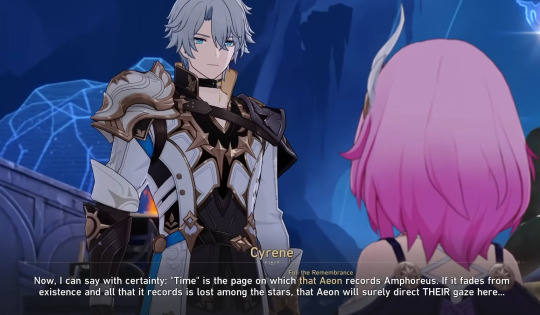
According to Cyrene, "time" is directly linked to the aeon of Remembrance, and therefore memory is inextricably linked to the passage of time in Amphoreus's story--making both central to the deepest remaining mysteries of Amphoreus's plot.
So, I wanted to take a bit to try to shuffle out my thoughts on where the plot is currently and where it may be going. This is almost all speculation, so take it with a grain of salt, but here's a bit of deeper dive on what I think 3.4 is laying out for us:
First, the issue of Amphoreus's time itself: There's still confusion about which cycles some events are taking place in, and major events are intentionally being shown to us out of chronological order. For example, when the Trailblazer appears in Aedes Elysiae as part of Phainon's "memory" of Cycle 0, Cyrene states that she's experiencing "deja vu" and makes several other comments throughout this memory walk hinting that she knows the Trailblazer is not the imaginary "Hero Within" friend she and Phainon created but an actual person from the future.
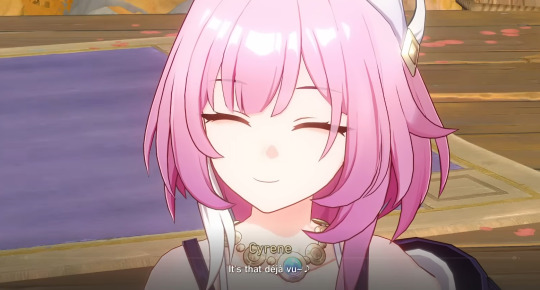
Some of this can be chalked up to Hoyo's cheeky habit of implying that HI3rd expies are "meeting the player again"--they did this with Acheron as well, just to hand wave it in Acheron's farewell as "Oops, my memory is kinda bad; this actually was our first meeting." Some of Cyrene's early connection to the Trailblazer probably can be chalked up to the "You're our imaginary hero-shaped friend" aspect. However, some of it feels far too intentional, calling deliberate attention to the collision of the future and past:
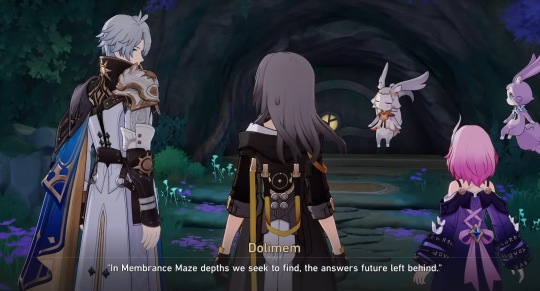
At the very least, I think the devs hit this note too often, and too consistently, to not also be implying something else: Cyrene already, even in Cycle 0, had memories she (theoretically) wasn't supposed to have yet and knowledge of the Trailblazer, specifically, that she doesn't currently seem to have any reason for having.
Tiny sidenote here, but the fact that it was hinted all along that our!Phainon from Cycle 33,550,336 is not actually named Phainon now makes no sense with the reveal that everyone in Cycle 0 Aedes Elysiae, in fact, calls him Phainon (including his parents and the fairies), and that "Khaslana" appears to actually be a name bestowed on him after the fact to associate him with the Worldbearing titan/Khaos. (Technically this means we still don't know what our!Phainon was actually named, unless of course it's also just Khaslana because memories of previous cycles somehow bled into later cycles despite the deadloops being referred to as "regressions" which implies deleting and starting again.)
Anyway, back to the main point again: The Chrysos Heirs that appear as "visions of Phainon's future" in Cycle 0 actually seem to be heirs of some other cycle entirely. Mydei refers to Phainon as Phainon, which he didn't do in Cycle 0, and talks about his duel with Flame Reaver, which also didn't occur in Cycle 0.
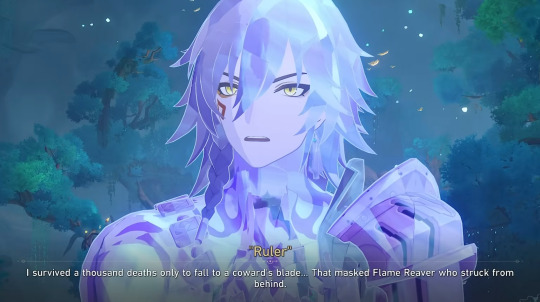
Theoretically, we're in Phainon's memory here, and at first glance, it might make sense to say that his memories may be jumbled from multiple cycles. Except we're supposed to be in our!Phainon's memory at this point, not Khaslana's (as this moment supposedly takes place before our!Phainon kills Flame Reaver), so our!Phainon should not have memory of Cycle 0 at all yet.
Of course, the more likely possibility is that we were never in Phainon's "real" memory at all, and instead were just temporarily removed to the "buffer zone" by Lygus, where he showed us a (possibly intentionally) jumbled set of memory data from "Phainon" based on what he (Lygus) wanted us to see.
It's intentionally confusing.
At another point, the dev team deliberately disguises which cycle we're in using ???:
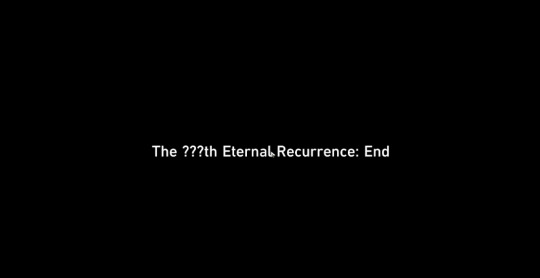
Why do this? It had already been revealed right from the beginning of the patch that we were in the 33,550,336th cycle. There was a literal running countdown throughout Phainon's entire Khaslana sequence giving us the exact number of cycles Khaslana would reach by the end. For what purpose would the devs list a scene as occurring in the ??? cycle... if not to deliberately obscure which cycle we're really in?
Furthermore, there's the question of whether what happens in this ??? scene (supposedly our!Phainon's fight with Flame Reaver) even really can be from the 33,550,336th cycle, given that Flame Reaver is suddenly able to speak in clear full sentences again, despite supposedly being so degraded by the actual 33,550,336th cycle that he seems to struggle to form coherent thoughts.
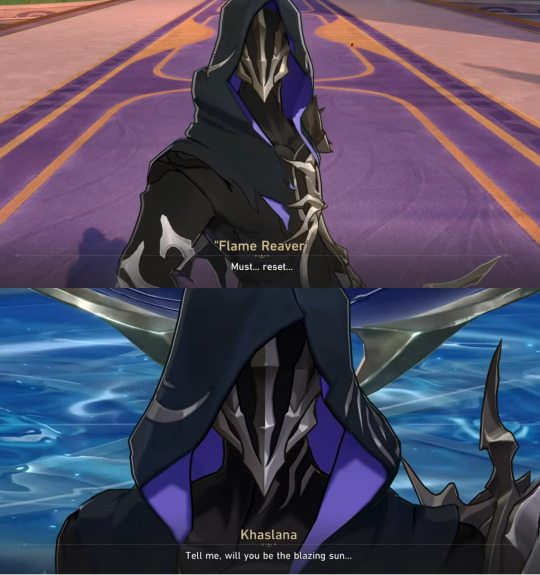
When is this scene really taking place, hmmm Hoyo?
(Okay, I might just be thinking into things a bit too much here, but seriously--why the "???" marks?)
Along the same lines, there's something interesting if you go back to 3.3 as well. I mentioned scenes being shown to us out of chronological order, and the ending 3.3 is a perfect example of this. Many of us were confused at the end of 3.3 when Phainon seemingly has no issue with Cyrene being alive out of nowhere. 3.4 resolves this by suggesting that we were actually being shown the ending of Cycle 0 at the end of patch 3.3.
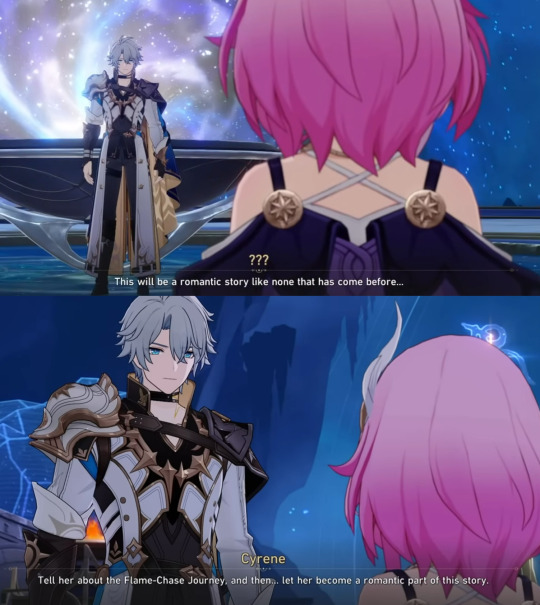
However... There's something not quite right about this either. Because in 3.4, Cycle 0 Phainon is fully aware of Cyrene, and they walked into the Vortex of Genesis together, facing Lygus as a team.
However, during 3.3, "Phainon" acts surprised to see Cyrene there at first, suggesting that he did not expect her to appear:
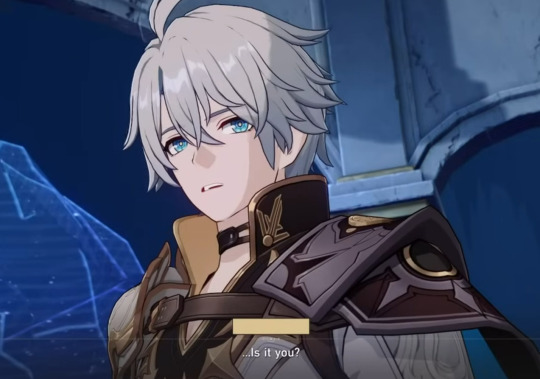
The scene shown at the end of patch 3.3 is not the ending of Cycle 0.
...So when is it?
At the end of 3.4, Mem says she'll send Trailblazer back to the "beginning of time" but also suggests that we'll continue to meet each other in new cycles. Mem also says that Cyrene is waiting in the "future," while the book says "in the past," suggesting that these two are essentially the same thing--the Trailblazer's future is Amphoreus's past, intertwining and recursive like a mobius strip.
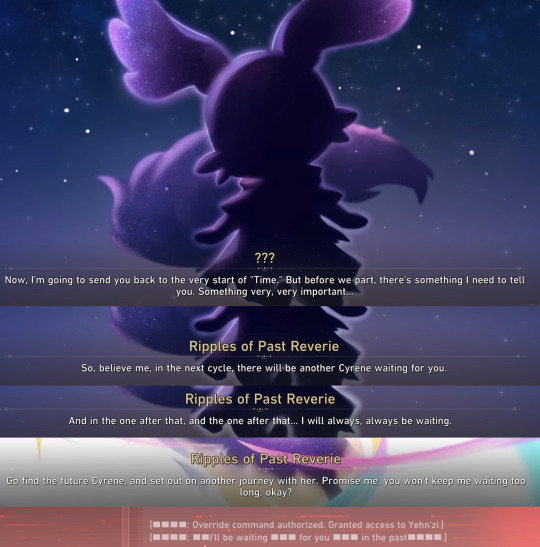
Overall, the impression this gives is that we may be headed into some sort of stable or semi-stable timeloop, and that the Cyrene of the future feels deja vu when meeting us because the Cyrene of the past already has. This is sort of alarming, as it could possibly suggest that we're not going into the past to successfully change it, to erase all the long years of Phainon and Cyrene's suffering; rather, we may just be closing a loop that already existed from the start, which would mean that all the actions which led to us going into the past in the first place would be inevitable...
Time travel plots are honestly kind of the worst lmao.
The concept of time in relation to Cyrene is also complicated in general, because who is it that has been trapped in the path space outside Amphoreus this whole time? Obviously it's Cyrene, but which one? Is it Cycle 0 Cyrene, sent out by that first time Phainon killed her? If that's the case, then who has Mem been the whole while? Has Cyrene's consciousness slivered into two (or more), allowing her to both exist outside Amphoreus and to exist inside it as a sentient being at the same time? (Never mind that this also calls into question how Cyrene could exist outside Amphoreus at all if they haven't yet been actualized into "real people"--she mentions that her "soul" will travel to some distant corner of the world and sleep, but at what point do electrical signals inside Amphoreus gain souls? The log suggests that Phainon may have crossed the "intelligence singularity" at the end of the 33,550,336th cycle--but Cyrene seems to have crossed it at Cycle 0?)
There's also the question about how Cyrene was able to do any of this. Theoretically in Cycle 0 she became Oronyx's demigod and therefore became a stand-in for the concept of Time itself; however, the "As I've Written" log updates clarify that all the power bestowed by the coreflames is actually just a heightened level of administrative privileges, allowing those who wield the coreflames to manipulate the simulation in ways that non-coreflame-wielders cannot:

The log also states that Phainon and Cyrene attempted to create a logic rupture by removing Cyrene (the concept of Time itself) from Amphoreus. However, by the point in Cycle 0, all the other demigods were also dead, and we know that the entire point of the OG cycles were for the Chrysos Heirs to die and be "reborn" as the next extrapolation's titans; therefore, the demigod of Oronyx would have died thousands of times inside Amphoreus already. How did killing Cyrene at the end of Cycle 0 do something different to "time" than what was already programmed and planned with the death of the other Oronyx Chrysos Heirs?
And how does "killing me in each cycle will send you back in time" even work, if Cyrene was not Oronyx's demigod in each cycle? Does Cyrene have actual control over time entirely separate from Amphoreus's extrapolations? If so, how?
(My head hurts, to be honest. I should know better than to think this hard lol.)
But, even more intriguing to me is how all this leads up to even bigger questions, the first of which is "What is Lygus even waiting for?"
In 3.4, Lygus states that the experimental question behind Amphoreus was already solved as of Cycle 0, and that none of the individual Chrysos Heirs, including Phainon and Cyrene, actually mattered much at all beyond being a tool for refining Irontomb.
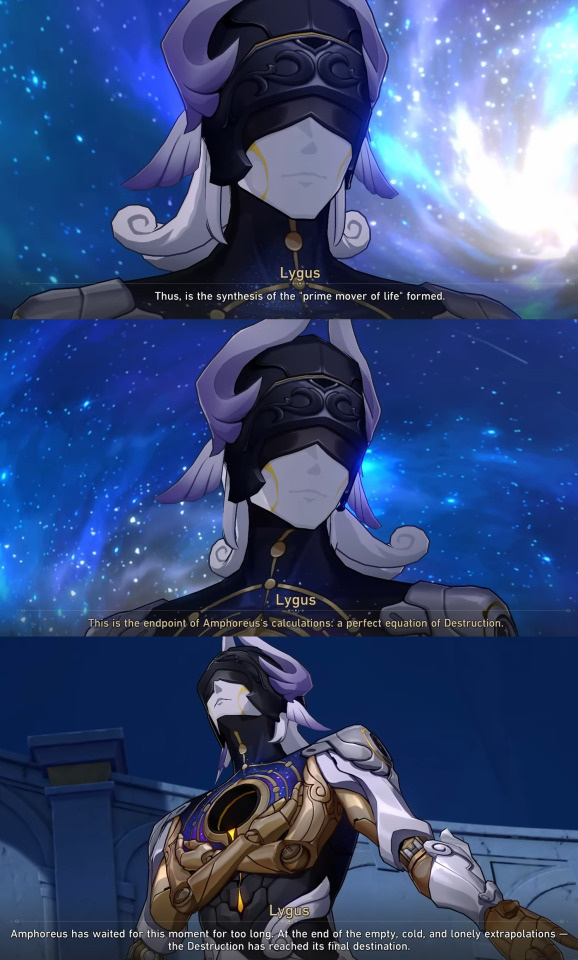
The only thing remaining between Lygus and his "Era Nova" is, according to Lygus himself, someone needing to step up and receive the gaze of Nanook to actualize the Scepter as a Lord Ravager.
But this... doesn't actually make much sense? The Scepter itself had already been gazed at by Nanook in the original 50,121st cycle. It was already a Lord Ravager long before Phainon and Cyrene ever existed!
Moreover, the simulated model of Destruction contained in it (the "Black Tide") was already deployed in other galaxies to near perfect success even before Phainon and Cyrene completed Cycle 0.
Why would a second gaze from Nanook, specifically to Phainon and/or Cyrene, actually be necessary?
Is the answer to the "equation of Destruction" really just people? Why does Lygus need Phainon and Cyrene Co. to "become real" in order to deploy an already solved "equation of Destruction"?
Why does the Scepter need someone organic in order to, as the "As I've Written" log states, "self-crown"?
Hmmmmm. 🤔
Simultaneously, trying to unravel Lygus's real role in the plot raises another question: Who is actually in charge of the Amphoreus experiment? In the new "As I've Written," Lygus is listed as the administrator and refers to himself as the "prime mover" of the experiment. We know that someone has been controlling Amphoreus's simulated data enough to change the setting of the story (setting the world's civilization level to "classical" for example) and also to direct the system to begin iterating with the original Chrysos Heirs becoming titans, etc.
But if Lygus has the power to actually control the system that completely, why would he not just delete Phainon and Cyrene entirely when they revolted and refused to go through with his plan? Or, at the very least, why not tamper with their memory files to erase Cyrene's memory of the aeon and lead them both into the "Era Nova" he wanted? Why was the "administrator" not able to override Phainon's commands to regress each extrapolation back?
This, of course, leads to the impression that Lygus wanted Phainon and Cyrene to loop the system--OR that Lygus does not actually have control over the experiment, and he can only observe it.
I think the first one is the interpretation most players are going with: Lygus only stood to gain by Phainon collecting more and more coreflames, more and more hatred. It was possibly Lygus's plan all along to drive Phainon personally into becoming an avatar of Destruction.
But... if the equation was already complete by the end of Phainon and Cyrene's Cycle 0, why bother at all? Why prepare a "gift" for Irontomb if Irontomb was already a Lord Ravager and had already determined the perfect path to Destruction by this point? Lygus had already, supposedly, achieved what he wanted--so why keep waiting?
Why not just replace NeiKos496 and Philia093 with new heirs and actualize Irontomb instantly with no problem?
It doesn't make sense, does it? Either Lygus could not erase/replace Phainon and Cyrene by himself... or his actual plan isn't just to launch Irontomb.
He may actually be waiting (or aiming) for something else.
All of this relates back to my main conjecture after completing 3.4: I am almost certain that Lygus is not what he seems. I don't usually dive too deep into plot leaks, so I could be totally off, but... something is still not adding up here.
Cyrene and Phainon even bring it up, stating that Lygus could have achieved his goal instantly if he had just kept to the shadows and said nothing at all.
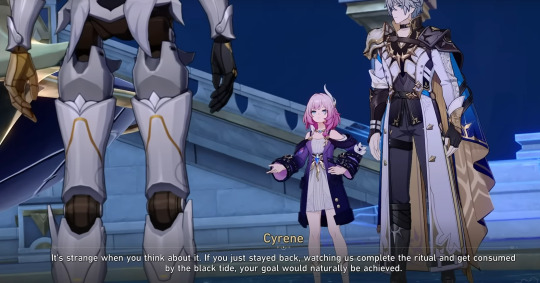
Phainon claims that Lygus chose to reveal himself and Amphoreus's connection to the Destruction because he was trying to cover up the fact that Amphoreus is also being gazed at by other aeons--but this makes no sense in practice.
How does Lygus revealing the existence of Nanook and Nous--thereby confirming the existence of multiple outside aeons--help to distract from those aeons? The game itself is even tossing it in our faces that if Lygus had said nothing, then Phainon and Cyrene would have gone straight into the Destruction without hesitation, which means that effectively, Lygus is the one who prevented Amphoreus from falling to the Destruction at the end of Cycle 0. Why? For what reason would Lygus have shared the truth of Amphoreus with Phainon and Cyrene, when it did nothing but--at least on the surface--seem to delay his plans at best, and completely derail them at worst?
When confronted about this, Lygus himself has absolutely nothing to say. It's literally just a blank close-up of his face. He never confirms or denies Phainon and Cyrene's claims, and he absolutely provides no answer for why he brought up the Destruction and the truth of Amphoreus to them in that moment. In writing, this is one of the most common and quickest ways to create red herrings: Character A makes an assumption, and Character B lets their assumption stand--only to reveal later that the assumption was wrong all along. Whenever there is an assumption ("Lygus is distracting us so that we'll go into the Destruction") that seemingly contradicts the character's actions ("Lygus's action here actually stopped Amphoreus from immediately going down the path of Destruction"), we have to question whether there is something more going on.
I mean, maybe Lygus really is just that over-confident and foolish. Maybe he's a straightforward, one-dimensional villain whose pride got the better of him here and he revealed all of this from sheer arrogance, confident that Phainon and Cyrene would never be able to stop him. Maybe he revealed all this because he wanted the regressions to happen right from the start, and Phainon's 33,550,336 cycles really were just Lygus's idea all along.
But the fact that we actually got a "Why would you reveal your plan to us like this?" callout in the writing of the scene itself is supposed to be a glaring red, entirely unsubtle flag for players--we're supposed to be going "Pump the brakes!! Something is NOT right here!!" My personal takeaway from the devs taking the time to literally go "Why would the villain be revealing his plan to us?" is that, of course, Lygus's actual plan has still not been revealed.
Lygus had a real reason for revealing Destruction and the plot to kill Nous to Phainon and Cyrene--but he hasn't actually told us that reason yet. Perhaps it is true that Lygus doesn't want Phainon and Cyrene to know what the other aeons are doing in Amphoreus--but doesn't that imply that Lygus, in fact, already knows what the other aeons are doing?
But if things aren't as simple as they seem, where does that leave Lygus though? If he still knows more than what he's revealed, if things in Amphoreus might still be going according to his plan, then what is the real plan? What is the real reasoning behind anything that is happening here?
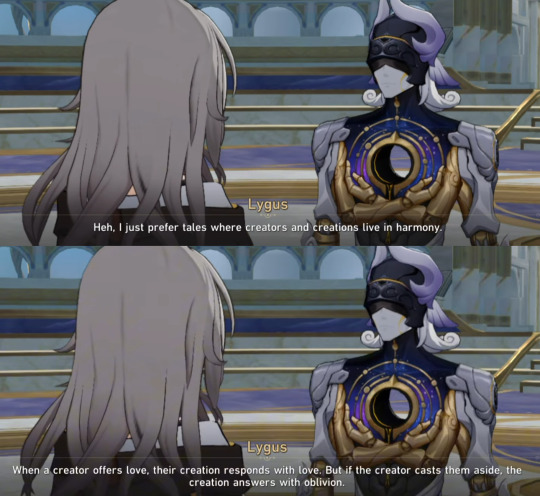
Before anything else, Lygus's pointed comments about creators and their creations--about the idea of abandonment by the creator--does seem genuine. The English VA work (while being very good) is quite different from the CN that I normally play with, with the English VA giving Lygus a very strong dose of barely repressed anger whenever Nous is mentioned. Nous is described "the source of all this tragedy" and Lygus reacts with visible frustration when the concept of being a "slave" to the gods is discussed.
Whoever is writing the logs in the new "As I'm Written" (seemingly Lygus, but there's always a possibility it's not) seems constantly fixated on the question of why Nous would abandon its "neurons," the Scepters.
This makes Lygus's plot smack, taken together with the comment from the "One-Day Talanton" questline, of the tantrum of an abandoned creation, striking back at their creator who left them alone. But in what way was Lygus abandoned by Nous, if that's who he's truly angry at? The game seems to suggest, at least so far, that Lygus is not actually Irontomb itself (Lygus refers to Irontomb as "you" in the new "As I've Written" as if it was a third-party object)--and only Irontomb has been described as abandoned by Nous so far.
So... Where is Lygus's rage actually coming from?
Did Nous abandon the Intellitrons somehow, in some way that hasn't yet been touched on by the plot? Or is Lygus's rage at abandonment actually Irontomb's "feeling"? Does Lygus's sense of abandonment and his desire to give a creator "oblivion" for casting its creation aside actually stem from Irontomb's being cut away from Nous's brain system? (WHO HURT YOU, LYGUS??)
Theoretically, there's precedent in the plot for this to be true. We're told in Gold and Gears that Rubert II inherited Rubert I's memories through the Anti-Organic Equation. Therefore, it's possible that Lygus is actually "Rubert III," having inherited the memories of Rubert I through the Anti-Organic Equation in the Scepter. This would align with the new "As I've Written," which suggests that the person writing the logs, presumably Lygus, is a recognized member of the Genius Society, as Rubert I was. (Or they're at least able to falsify their identity enough to pass as a GS member...)
If Lygus is a cover for a real Genius Society member, we know Polka Kakamond, Screwllum, Herta, Ruan Mei, Stephen Lloyd, and all the confirmed dead members are off the table. That leaves only those who either haven't been foreshadowed at all (or much), like Yu Qingtu, or those closer to the situation: Rubert I or someone close enough to Nous to have a personal grudge.
Lygus could very well be some Rubert I-Rubert II amalgamation reborn, furious at Nous for THEIR choice to abandon the Scepter system, perceiving it as a creator abandoning their creation to the cold abyss.
But there's also something weird going on with how Nous is described--because Nous is, in fact, a creation in and of itself, and THEY are described as a creation that paid their creator back with cruelty. The logs say that the moment Erudition was born, all genius, all thought, all knowledge in the universe became THEIR slave. Therefore, all members of the Genius Society (presumably including Lygus) are already slaves to Nous, even though it was a member of the Genius Society (Zandar One Kuwabara) who created Nous in the first place.
So if Lygus's anger is about a creation that hates its creator... then which creation and which creator are we talking about?
Nous creating Scepters--or someone creating Nous?
I cannot think it is accidental that Lygus's appearance is repeatedly mirrored to Nous's through the severed head and red "eye."
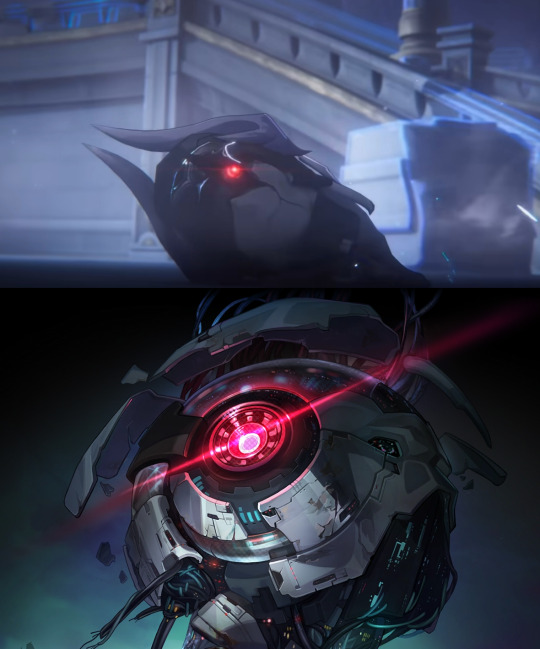
There's even the fact that Nous appears in Fu Xuan's memories as a man with his eyes covered, much the way Lygus's visor normally blocks his eyes from view.
This is just too close and too consistent (shown multiple times from 3.3 to 3.4) to be unintentional. Something is going on there.
(There's the other consideration too: Lygus says he likes stories where creations and creators get along and knows that creations that are treated poorly by their creators respond with violence--is Lygus not, sort of, Phainon's creator? Does he actually long for the oblivion that comes from abusing a creation?)
Anyway, to complicate the situation even further, there's also a third option about Lygus's plan: Perhaps all of this is nothing more than a ploy, with all of Lygus's anger being just a play-acting facade?
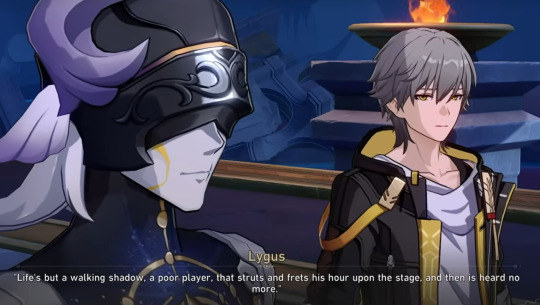
Could Lygus be pretending to take on Irontomb's hatred toward Nous in order to actually achieve a different end, to disguise his real plan behind the smokescreen of abandonment issues? Is Lygus's "anger" the real distraction to keep us from understanding where his actual allegiances lie?
Is Lygus's story a straightforward tantrum over being abandoned--or a clever ruse for an entirely different stance?
Your guess is as good as mine, because the game is extremely contradictory when it comes to Nous. The new "Fables About the Stars" video suggests that the Lord Ravagers see the downfall of Nous as the first step to winning the War of the Aeons--killing all intelligence in the universe will leave civilizations too weak and ignorant to defend themselves. Ergo, we could say that the Lord Ravagers actually view Nous as a force for good, protecting the universe from Destruction.
But Lygus--and others throughout both Gold and Gears and the Unknowable Domain--describe Nous as a slaver, a being whose very existence closes off all possibilities for the growth of intelligence, because simply by existing as the concept of Knowledge itself, all questions are already anticipated, all answers are already known. There is no meaning to seeking knowledge if all equations have already been solved, if all solutions have already be calculated.
Free will cannot exist if all possibilities have already been foreseen.

So is the Erudition a well-meaning being, the kind old man who warned Fu Xuan away from the pain she would feel from THEIR gift--or a cold and emotionless void that seeks ever more knowledge, even at the cost of life itself?
Let's not forget that it was the Erudition's tacit approval of the Anti-Organic Equation that put the final nail in the coffin for Nanook's home world and caused THEM to ascend as an aeon--Nanook's beef with Nous is personal.
In the war of concepts, does Erudition represent a net positive for humanity--or a dangerous pinnacle where we teeter on the brink of total intelligence collapse?
Tiny aside here, but I think it is also worth noting that just as Cyrene has weird timey-wimey wibbly-wobbly-ness going on, so too does Nous. The new "As I've Written" logs suggest multiple times that something is not quite right with the administrator's understanding of the timeline surrounding Nous:
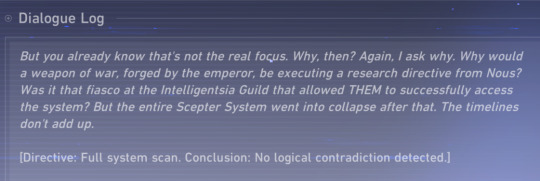
(This may also be related to the Gold and Gears moment where Ruan Mei notes that it should have been impossible, time-wise, for Rubert II to have had the connections he did to the first Mechanical Emperor's War--which the geniuses on the Herta Space Station debate about for some time.)
We are also told repeatedly throughout the game that Nous is linked to the idea of divination, because THEIR calculations are absolute, and THEIR predictions are (according to Polka Kakamond) always true. Nous's thoughts are not just thoughts but fixed points in reality, "INSTANCES" and "MOMENTS" that are said to anchor the very future of the universe:
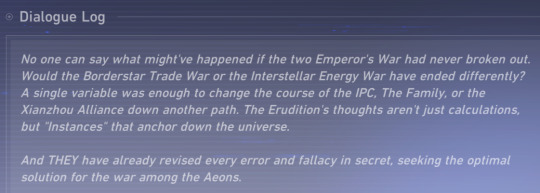
And if Nous already knows all things that will come to pass, has calculated all possible outcomes for the war among the aeons already...
Then wouldn't all of the Amphoreus experiment also just be Nous's own plan?
The "As I've Written" log literally suggests as much:

The game itself is playing with this concept extensively in Amphoreus, leading us time and time again to the conclusion that Erudition and Destruction are not opposed to each other.
While we could dismiss the unflattering image of Nous in Lygus's logs as pure propaganda, just anti-Nous rhetoric to convince the Scepter to target Nous specifically, there's the ring of truth in the idea that Erudition is not only a destructive path but also a self-destructive one as well.
We've received not one but two end-game modes about conflicts stoked specifically by Nous and/or their followers, with the knowledge that the Anti-Organic Wars completely reshaped HSR's cosmology, based almost entirely around the Erudition path's uncontrollable curiosity and unfettered desire for knowledge. In seeking more and more and more information, we know that many geniuses of the Genius Society have instead led their worlds (or others' worlds) into Destruction, such as Chadwick whose invention of the Imaginary Implosion Pulse resulted in the annihilation of 24 planets, or Rubert I and Dr. Primitive. Even Ruan Mei, ostensibly a "good guy" on our side, dabbles with horrific things like necromancy and resurrecting the Swarm in her pursuit of knowledge.
Although there are altruistic members of the Genius Society, the overall impression is that of a group which places their own personal intellectual interests above the safety of the universe, eschewing ethics and morality entirely if it means getting just that much further ahead in their research. (Screwllum even has to remind Herta once they make it into Amphoreus that she shouldn't get distracted with her own interests while people's literal lives are on the line, and Herta is one of the goodies.)
If the human followers of Erudition are willing to put aside ethics and empathy in the search for answers... What does that mean for Nous, the inorganic "brain" of the universe, whose only prime directive is to seek knowledge?
Does Nous care at all about the fate of universe--or only about finding the "answers"? Is the Erudition an aeon capable of loving life, like the very human Akivili? Or is Nous truly nothing more than a cold and rational computer, reducing all human existence to mindless lines of numbers and data, conducting horrific "thought experiments" using the real universe as its testing ground, terminating experiments without hesitation, and seeking answers even at the cost of life itself?
What if the "universe's answer" that Nous found... was an ultimate fate of Destruction? Would Nous help avert that--or steer us toward it instead?
The new "As I've Written" logs hint at this dangerous view of Erudition frequently, alongside the suggestion that Erudition is, by default, a self-destructive path.

Anaxa, who is aligned with Erudition's path in Amphoreus's simulation, is said to perfectly reflect Erudition's "self-destructive" tendencies, with the log suggesting that those who follow Erudition are not only willing to sacrifice others in their pursuit of knowledge, but even more willing to sacrifice themselves.
The act of learning can be, in itself, a form of destruction.
I don't have the time or energy to really expound on this thought the way it deserves, but the wording that so often surrounds learning is (even in real academia) frequently related to destruction--you can "tear away the veil of ignorance" or "destroy your previous conceptions;" knowledge can be "acquired" by force, and students often lament the collapse of their mental and physical health while they frantically work to complete their studies.
The pursuit of truth is both the most necessary hunt in existence and the most ruinous.
Just like Lygus's logs suggest, the rest of the game--and our understanding of the real world too--also suggest that there may already be inextricable links between Erudition and Destruction.
However, Amphoreus's plot is simultaneously inviting us to consider Destruction in a different light as well.

In Amphoreus's simulation, rather than "the end of all things," Destruction becomes a catalyst for growth and rebirth. Inside the Amphoreus simulation, extinction events are what allow evolution to flourish, the threat of destruction is what fosters an all-powerful drive to live, and through the constantly reiterating cycles of Chrysos Heirs killing and then taking on the role of the titans they've obliterated, the electrical signals inside the Scepter grow in strength and ability, approaching the "intelligence singularity" that will allow them to "become real."

In fact, it's only when Phainon achieves a state of pure Destruction and is gazed upon by Nanook once more that he appears to have possibly crossed this "intelligence singularity," implying that--through Destruction of the Self--Phainon, after being actualized from Irontomb, may be capable of becoming "true" life.
The conclusion that Lygus--and the Scepter and Nous--seem to have reached is that Destruction is, in fact, the prime mover of life.

Simultaneously both the end and the beginning of existence.
Again, this might be nothing but crazy, biased conclusions inserted into the system by Lygus in his bid to ensure Nous's destruction--but it does also have the ring of truth to it, doesn't it?
Our known universe itself began with a singularity, the "Big Bang" that "hurtles" galaxies through the cold, dark void, sparking the primordial fire that gave birth to stars. In virtually every world religion, a great destruction gives rise to new civilization--the Flood wipes humanity off the map, the plagues destroy Egypt to free the Hebrew people, Shiva (whose name means "kindness") destroys the universe in order to create it anew, resetting the eternal cycles as souls refine themselves of impurities on their path to liberation. Flowers must die in winter before they can be reborn in spring. Forests need fires in order to flourish. The hero on his Hero's Journey faces symbolic death in order to rise up as a new, better person.
Life and death--Thought and Destruction--are an endless cycle, maybe no different from Amphoreus's own endless cycles.
I want to pause here to include one more way of thinking about Destruction which I think Amphoreus's plot is heavily alluding to: The connection between Destruction and the concept of Chaos ("Khaos").
In ancient Greek mythology, the universe itself was born from Chaos, typically in conjunction with other deities/concepts such as "Gaia" the earth or "Nyx" for night. In the ancient Greek tradition, "Chaos" is not the wild, disorderly bedlam we might imagine from that word today, but instead a primordial void, containing simultaneously nothing and everything at once--the possibility of all things both good and bad.
This notion that the world began in a chaotic void is also present in many different religions--"Let there be light" in Christianity, for example--and has reached nearly universal cultural acceptance as people imagine the scientific origin of our universe itself as being a sort of endless black emptiness until the Big Bang singularity.
Thus, when we think of the start of existence itself, we think of "chaos" and the darkness of the void.
In other words: Khaos and Evernight.
In Paradise Lost, a text which HSR has actually referenced obliquely several times before, John Milton writes that all existence was born from "Chaos and Old Night," where "Night" is the beginning and origin, erasing but also containing all time and memory, and Chaos is the substance-nonsubstance all-encompassing seed of existence:
Before their eyes in sudden view appear The secrets of the hoary Deep, a dark, Illimitable ocean, without bound, Without dimension, where length, breadth, and height, And time and place, are lost; where eldest Night And Chaos, ancestors of Nature, hold Eternal anarchy, amidst the noise Of endless wars, and by confusion stand. For Hot, Cold, Moist, and Dry, four champions fierce, Strive here for mastery, and to battle bring Their embryon atoms: they around the flag Of each his faction, in their several clans, Light-armed or heavy, sharp, smooth, swift or slow, Swarm populous, unnumbered as the sands Of Barca or Cyrenè's torrid soil.
Milton describes his conception of Chaos in Paradise Lost as "the womb of nature and perhaps her grave," full of the "dark materials to create more worlds." In another of Milton's work, his treatise on Christianity, Milton describes Chaos as "not an evil thing, nor to be thought of as worthless: it was good, and it contained the seeds of all subsequent good.”
Thus, for Milton--and for the many, many pieces of media inspired by his views--Chaos is a thing of both good and evil, containing all possibilities for Destruction as well as Creation.
It shouldn't be hard to make the connection to HSR here. We are told repeatedly that inside Amphoreus's simulation, electrical signals possessing certain ideologies all began to name themselves after "Khaos."
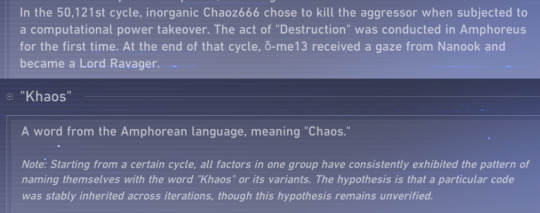
It was Chaoz666 that caused Irontomb to be recognized as Lord Ravager by Nanook, and later "Khaos" who became Kephale, bearing the world on his shoulders as the model for Phainon to follow. Phainon's own bestowed name "Khaslana" is actually "Khaoslana" in Chinese. Ergo: Phainon is the representative of the oldest meaning of "Chaos"--not mindless, disorganized hatred, but the potentiality of all things, bearing the chance for Destruction and Creation in equal capacities.
And if Phainon, Destruction's avatar, is a vessel containing the seeds of good, the "dark materials to create new worlds"... What does that say about Destruction itself?
Is Nanook the culmination of entropy, the heat death of the universe, the process by which all things will eventually reach Finality?
Or, as the Scepter has concluded, is Destruction actually the prime mover of life, the end of one cycle so that a new cycle can finally be ushered in?
Will the power of Destruction in Amphoreus be used to end life--or to create it?
In our oldest of legends, Chaos--all good and evil, all beginnings ends, all destruction and creation in one--combined with time and memory (the Evernight), to create the world as we know it, bringing true life into being from the void.
Make of that what you will.
To me, by far the most interesting element of patch 3.4 was not Phainon's individual suffering, sad as that was. Instead, the most powerful part of 3.4 was definitely the questions it raises about the aeons.
Thought goes hand-in-hand with existence ("I think, therefore I am"). Death goes hand-in-hand with time ("Memento mori"). Destruction encompasses both the end of thought (Erudition) and the beginning of memory (Remembrance).
Amphoreus is asking a series of very interesting questions on the cosmic level: Are Erudition and Destruction two sides of the same coin, does Destruction goes hand-in-hand with life, and what does this all really mean for the upcoming "War of the Aeons"--leaving me with perhaps the most important question of all:
If Finality truly means the end of all things forever, would Destruction--with its possibility of rebirth, of evolution from the ashes--actually be the better choice?
Amphoreus is a world that has "died" and been recreated millions upon millions of times, blessed--or cursed--with Nanook's golden blood, and poised to ultimately be "reborn" into true life from the destruction it has experienced.
It's very hard to miss the symbolism suggesting that the power of Destruction is actually essential to escaping endless futility and stagnation into non-existence.
The meal is tastyyyyy; thank you Hoyo.
So, all in all, the biggest 3.4 takeaways:
Phainon and Cyrene are almost certainly going to be able to use their powers (perhaps combined with[in] the Trailblazer) as Chaos and Old Night to give Amphoreus the "birth" it deserves to become its own world.
Lygus's actual plot is still entirely unclear, and his seeming hatred for Nous is complicated by many outside factors that may be obscuring his true intentions, not the least of which is still the clearly distorted sense of time and looping going on inside Amphoreus. We have no way of knowing at this point why he's so gung-ho about making Phainon and Co. into "real people" and what he actually thinks about the Scepter's conclusion that "Destruction is the prime mover of birth." I can't stop laughing, someone please give Nanook a baby.
Nous may or may not be entirely intertwined with the notion of Destruction, as much a force for annihilation (and self-annihilation) as Nanook.
Nanook may not represent, for Amphoreus at least, what it seems on the surface, and the power of Destruction will almost certainly be essential to bringing Amphoreus into the true Era Nova it deserves.
Phew! That's my thoughts, anyway!
202 notes
·
View notes
Text
Failing to Deliver: HSR 3.4 and the Concept of "Narrative Promises"

I got the chance to finish watching a friend stream 3.4, and having seen the whole thing a second time, I'm actually even more convinced that 3.4 is likely not what it seems on the surface. I might be huffing premium grade hopium, but I'm slowly convincing myself that 3.4 was never intended to be the self-contained conclusion to Phainon's character arc; rather, its actual purpose is simply to be set up for a more significant conclusion later. ...It's either that or one of the biggest fumbles I've seen with a centerpiece character in quite some time.
I guess we'll find out later!
But in the meantime, I wanted to talk about the most important gripe I had with the new patch: The bait-and-switch swap of the Trailblazer to the "true Deliverer." (Okay, well, actually the biggest gripe I had was the devs reusing every model possible instead of putting any budget into poor Phainon's patch, but you know!)
First, don't get me wrong--I'm a Trailblazer fan as much as anyone, and I fully understand that in a gacha game that encourages self-insertion, of course the MC is going to end up being the main hero. I never expected Trailblazer to be anything less than 1000% essential to saving Amphoreus.
But being essential to saving a world does not always mean taking the literal, highly dramatized role of the "Savior" (capital S). We do not always need to become the quintessential White Knight in order to win. Consider the Xianzhou, where Dan Heng and Jing Yuan still got their chance to shine. Consider Penacony, where Acheron's "saving" Penacony from Aventurine was a more open moment of heroism than Trailblazer versus Sunday, where the events that occurred in the theater were literally suppressed to avoid terrorizing the public, so Trailblazer's actual heroism goes largely understated.
This is very much in line with what the game has told us about the essence of Trailblazing--those on the path of the Trailblaze are "Nameless" because their (usually) brief visits can spark colossal change in the worlds they visit, but their individual identities are less important than the spirit they carry with them and the hope they collectively represent. The Trailblazer as a stand-in for the sheer concept of Heroism does make perfect sense--but the Trailblazer actively usurping the role of the "Savior" from one of the planet's "natives" does not. It runs contrary to what we saw in Belobog (where Bronya remained the hero of her people), Xianzhou (where Jing Yuan was held accountable and stepped up to fix his own mistake), and Penacony (where the real "showdown" was between the IPC and the native Penaconians). We are always "a hero" in the worlds we visit, but rarely--at least for the natives of that world--"THE Hero" (capital H).
There is, in the concept of Trailblazing that the game has set up so far, what we can call a soft "narrative promise."
In storytelling, narrative promises are the premises suggested by the genre and the author, throughout the course of the story, that convince readers to expect certain outcomes.
Genres exist entirely because stories set up "narrative promises" at their beginnings and carry them through to their endings. For example, if you're watching a Disney princess movie, you know you've already been promised a "happily ever after." If you're reading a mystery novel, then you've already been promised the mystery will be resolved by the end. If you're watching a horror movie, you already know someone is going to die.
But outside of genre, authors can make all sorts of individual narrative promises to their readers. If an author builds up two characters, gives them insane chemistry, and hints at the possibility of romance for them throughout the course of the whole story, then of course, your expectation will be for those two characters to get together by the end, right? If an author hints that a character has done something unforgivable, readers will expect that character's karma to catch up with them and anticipate seeing them get what they deserve by the end. There's even the concept of Chekhov's Gun, the rule that an item or plot point mentioned early on the story must always have its use or payoff by the end.

The role of the Trailblazer and the concept of Trailblazing in general in HSR comes with a sort of tacit promise to the player: "Your character will travel the universe and touch many lives. You will change the course of entire worlds and bring hope to those who have long lost it--but then, heedless of reward or fame, you will depart again on your next journey, each world just a fleeting moment in your long story." The Trailblaze oath, "May this journey lead us starward" captures clearly the idea that the Trailblazer is, in essence, the "wandering legend," the one who appears when the hour is most dire but whose identity is ultimately fated to fade from memory, because though we may touch a thousand-thousand other lives across the course of our adventure, our destination is always somewhere up ahead--we do not belong in any of the places that we stop, and our character is always destined for something beyond.
Amphoreus was already toeing the line of this concept, teasing the possibility that the Trailblazer had become too intertwined with the fate of the planet to be able to leave again, to continue on their Trailblazing journey unimpeded.

But even while saying this on the surface, we as players know this is absolute nonsense. Leaks for the next world are already starting to come out. We already know the main plot of the story will require us to pack up and move along from Amphoreus in three or four more patches at best.
The narrative promise of the Trailblaze itself is telling us players that our character will never become so attached to a world that we can't disengage from it and move along, so everything pointing to the Trailblazer becoming inextricably bound to Amphoreus, of only us being capable of being the world's true hero...
All of it feels like little more than blustering, weakly attempting to persuade the player to buy into stakes that don't actually exist.
"The one who will be recorded in Amphoreus's history is you, Trailblazer!"
Cool, awesome, that is not at all what Trailblazing is about. This idea that the Trailblazer will become the true hero of all time in Amphoreus and usurp that role from a "native" of the world isn't consistent with what we've been "promised" about Trailblazing as a concept.
Simultaneously, the idea of the Trailblazer taking over as the "real Deliverer" from Phainon is also breaking another massive narrative promise established by the story: From 3.0 to nearly the tail end of 3.4, we are told time and time and time again that Phainon is the Deliverer.
We're told this visually: Phainon's entire design is built around sun symbology, from the sun on his neck to the emblems on his coat, to his glowing golden blood.

We're told literally, as every one of the other Chrysos Heirs reinforces Phainon's status as "THE Deliverer":




And, more importantly, we're told this thematically, as the first three patches of Amphoreus revolve, at least to a certain extent, around watching Phainon trace the exact steps of the hero's journey. We learn of his call to action with the destruction of Aedes Elysiae, his rising to the call by choosing to join the Flame-Chase Journey with Aglaea... We see his early trials as he grows in strength and wavers over his ability to rise to the hero's role--

and then we see that rise itself, with Phainon moving away from his originally self-centered focus on revenge against the Flame Reaver to stepping into the genuine leadership role by the time 3.3 rolls around:

We watch this rise in the crafting of the blade literally called "Dawnmaker," in Phainon stepping up in 3.3 to pull an actual god out of the sky... And then, of course, in 3.4, when Phainon shoulders a burden like none seen before, bearing the weight of 33,550,336 cycles and 400 million coreflames to ensure that Amphoreus will not be able to birth a new Lord Ravager and become the destruction of their galaxy and more.
We watch him give everything, descend into agony and madness, kill those he loves most dearly again and again and again all so that he can fulfill his duty...
Only to be told he's just "one of" the heroes. Not THE hero.
Not the dawn.

"I am the blazing sun, destined to rise."

"Did you see? Amphoreus has ushered in the dawn."

"They say, if suffering has an end..."

(What was this for? What was all of this even for?)
The "Nameless Faces" trailer launched in January. It's July. For half a real year, the game's patches and promotional materials have all been making us a narrative promise: Phainon is the Deliverer. He will become the hero who saves Amphoreus.
And 3.4 broke that promise.


Phainon isn't going to become the dawn. He's not the Deliverer. He is--word-for-word from the game itself--just "fuel" for the fire that the Trailblazer is supposed to carry into the new world to become the real savior.
Six months of build up for a "just kidding" conclusion.
Now, hang on. I can hear some people who liked this twist already jumping to defend it. Yes, it is possible and sometimes even incredibly good storytelling for authors to break their narrative promises. Sometimes the shock effect and the surprise ending are the best routes to take. Sometimes ironic revelations can be the most powerful writing in the world. There's a post about this on Reddit that suggests a famous example: In the legend of Orpheus, our assumption is that Orpheus will be rewarded for his loyalty to Eurydice and be able to rescue her from the Underworld. But that narrative promise is ultimately broken--Orpheus fails his mission by looking back--and the message of the story becomes that broken promise. The story is a deeper and more meaningful meditation on love because it did not have the happy ending that its set up seemed to suggest it should have.
Sometimes it is possible that "subverting expectations" produces a better story.
But... does that really seem like the case here? After building him up for six months, then giving us four dedicated hours of torture porn as we RP walked him into abject despair, does it really seem like shifting the story's focus, taking away Phainon's role as "THE Hero," will really improve the quality or message of this story?
Even the Trailblazer doesn't seem to think so, resulting in wishy-washy messaging: We players are given the option to try to undo what the game itself is doing, though of course we know our dialogue choices have no real effect.

A broken narrative promise can be powerful. It can be justified and good and meaningful.
But it has to be earned.
Did 3.4 earn the right to subvert Phainon's role as the Deliverer? Did it properly lead us players to the conclusion that Amphoreus would be better off with a different hero, that Phainon didn't deserve to be the Deliverer, or that anyone else could do it better? Did the game manage to convince us that Phainon's story would have a more meaningful conclusion if he wasn't THE hero? Did it manage to convince us that all of Phainon's character build up and importance in the plot so far were better off being utilized in a different role?
I think the answer here is a resounding no.
And the crazy thing is, I don't think this was impossible! They could have earned this broken promise! They could have convinced us that Phainon's story wasn't meant to go where we hoped it would. With proper build-up, 3.4 could have been a very meaningful deconstruction of the Hero's Journey, with a message about the consequences of bearing too much responsibility for any one person, of breaking down in the face of insurmountable expectations, and of no one being capable of shouldering the literal weight of the world all alone.
It wouldn't even have been especially hard to do this. If the story had just been slightly tweaked, it would have worked more effectively:
Show Khaslana doubting himself as he begins the cycles. "Can I do this? What if I just mess it up?"
Show Khaslana starting to doubt that his decisions mean anything at all. "Even if I consume an infinite number of coreflames, what then? How will I get out of the system?"
Show Khaslana stumbling--a cycle where he nearly fails, or where he's forced to leave that iteration before collecting all the coreflames, thus opening up the question of "What if mistakes keep happening; what if things slip by me and Lygus wins?"
They also needed to let Khaslana actually grapple with the warnings his comrades were giving him. The game did do a good job of hinting that Khaslana's choice to infinitely loop Amphoreus was probably not a good idea, such as Anaxa saying early on:

But this, and many other similar statements about Khaslana becoming callous and cold-hearted, is effectively thrown away by the story because there is no reflection on it. The story tells us that Phainon can't stop collecting coreflames and regressing the world, so he doesn't. We don't actually get to see him grapple at all with Anaxa's question here, of whether he's made the right choice and whether the iterations are actually going to help anything. He just says "I never had a choice" and moves on. Even we, the player, are put in the sort of back-and-forth state of "Yes, Khaslana is killing his comrades and that's bad, but he's doing it because if he stops, literally millions of real people will die."
It's difficult to be persuaded that there's enough of a genuine moral quandary here to justify saying "Khaslana isn't a hero anymore" when the choice is between a simulated universe that restarts with the push of a button and the fate of actual reality. He may not be a hero to the Chrysos Heirs he has to kill in each cycle, but we're not led to believe that his heroism towards the actual universe ever wavered even the slightest.
We needed to see scenes of "the Hero Within" wavering, starting to fade out, where Khaslana's grasp on the concept of heroism itself started to fade away.
And ultimately, what we needed to see was Khaslana actually burning himself out. It needed to get to the point that the burden was so heavy it couldn't be carried by a single person.
We needed to see a scene where Khaslana met again with the barely there vestiges of the Hero Within and broke down, where he whispered in a cracked, broken voice: "I can't do this alone anymore."
If the story trajectory had led us organically to the message that "The weight of the world is a burden no one can bear by themselves; the collective will of all those who wish for a better future is required in order to bear the burden of deliverance," then it would have made absolute and perfect sense for the Trailblazer to appear, to prop the fallen Khaslana up on their shoulder and say "You're not alone, Phainon. That long night is over. If your steps waver just before the sunrise, then let me be the one to carry you those last few moments into the dawn." Then it would have made perfect narrative sense for the Trailblazer to step in as "the concept of Heroism itself," as part of "the Deliverer," as one hero helping another to achieve the greater goal.
I fully believe they could have done "Khaslana passes the torch on to the Trailblazer to finish the final moments of the mission" well.
They just... didn't.
Even worse, because there's never any real reflection on the way heroism can become a toxic burden to those who seek it, we're left with not only a weirdly unexamined theme in 3.4 but also a deep despair for Phainon as a character.
It feels like we, the player, are betraying him by going along with where the end of 3.4 dragged us. Did you really want to say "I will become Amphoreus's dawn" after watching Phainon struggle 33 million times to usher in that dawn?
In fact, this patch also went so far out of its way to give us insight into Phainon's actual dreams that it hurts all the worse:






Every point leads back to the same conclusion: Phainon wants to be the kind of person who helps others, who achieves people's wishes, who carries their hopes with him, who protects and guards what he cares for, who can be counted on--also someone who is strong enough to tussle with warriors, who is respected enough to be part of victorious homecoming parades, who is the role model for children...
Phainon's wish is to be a hero.
And, without our consent, 3.4 forces the player to take that role from him.
Phainon wants to fulfill everyone else's wishes--but we're not given the option to truly fulfill his.
Does anything from 3.0 to 3.4 convince us players that Phainon will be truly happy being nothing but a burning ball of hatred to throw at Nanook? Does watching his own inner hero fade out to become the Trailblazer feel like a fitting end for the internal heroism of someone who has given so much? Does he sound fulfilled when he says that he'll throw himself on the pyre once again?

All of 3.4 is what Phainon must do, and none of it is what he wants.
The narrative promise being broken by 3.4 isn't just about who will usher in Amphoreus's dawn. It's also about playing a game that insists on the beauty of life, of not giving into nihilism and despair, about a 100+-hour-playtime promise that chasing your dreams is the most worthwhile pursuit in all of life--only to watch the character previously situated as the patch cycle's "main character" be treated in the exact opposite manner of the game's own central message.
The story leads us over and over to the same conclusion, makes the same promise over and over--the inner hero Phainon possessed all along will become his true self, a true hero who can shine the light for those he loves--only to revoke it in a twelve-line-long dialogue option at the very tail end of the patch without so much as a prerendered cutscene to give it more weight.
It's not that Trailblazer becoming the Deliverer is the worst thing ever--it's that the writing of the story did not properly build up in a way that would make that a satisfying conclusion.
It doesn't suit the Trailblaze, it doesn't suit what the first three and a half patches of Amphoreus set us players up for, and it doesn't suit a beloved character like Phainon who humbly dreamed of just getting the chance to protect his home and friends and see their wishes fulfilled. Even Shaoji himself says it: Hatred as a primum mobile doesn't suit Phainon, whose true root is the desire simply to love and be loved by others.
If heroes are those who fulfill the wishes of others, what kind of hero are we, the Trailblazer, if we can't even help Phainon become the person he truly wants to be?
"But Phainon doesn't care about himself, his wish is only to help others and he doesn't care about his own desires."
Yes, and the game itself tells us this is a bad thing.

The game itself tells us that Phainon's complete destruction of the self in order to bear the burdens of others is a horrible decision, and that he should have thought about himself, that he was entitled to his own happiness--and then 3.4 ends without giving him the slightest option to achieve that.
It's both intellectually and emotionally bad, contradicting its own message.
...Which is why I don't think things will stay this way.
Maybe I'm just too hopeful, but to me, it seems that if there's something in the writing that really isn't adding up, that's really contradicting the game's core message in and of itself...
Maybe that thing isn't supposed to feel right.
Maybe we're supposed to feel off about this choice for the Trailblazer to "become the Deliverer" because maybe things aren't as straightforward as they seem on the surface.
So, my (probably) hopium-induced conclusion from all this is that there's a bigger plot afoot than what we currently know.

The scene where the original Phainon and Cyrene confront Lygus seems to suggest that the plan is just to endlessly cycle as a way of stalling for time until Fuli gazes at Amphoreus. But does the gaze of Fuli actually achieve anything in and of itself?
Now that they know their world is nothing but data, could Phainon and Cyrene actually be happy with just forestalling Destruction?
Would they not want more for their world than to remain an experiment?
My guess is that the real plan all along was to utilize the power of the Scepter, combined with the power of Remembrance (and possibly also Erudition for good measure) to actualize Amphoreus as a real planet, making all its inhabitants into "real" people and allowing them to escape the experimental nature of their existence, while also neutralizing the threat of the Lord Ravager.
Thus, Phainon's "I'm going to go burn myself out attacking the Destruction" is actually not a "I don't have any better ideas, so hopefully punching god helps" but a deliberate part of the longer ploy to penetrate the Scepter, get "on the inside" of Irontomb, and seize the power of the Destruction for Amphoreus.
The entire bait-and-switch "who is the actual Deliverer" plot might even, then, be an intentional ploy to divert attention away from Phainon's actions, giving him time to assume control of the Scepter's systems while the Trailblazer and Cyrene work to achieve their end of the plan.
If this ends up being the case, then Phainon's role as the "hero" won't be ending here, and the role of "delivering" Amphoreus--while also tied closely to the Trailblazer--will nevertheless stay with Phainon too.
Personally, I can only hope this is the direction they intend to take the rest of Phainon's role in Amphoreus, because if it turns out that this was genuinely supposed to be his end and the remainder of his contribution to the story, I think it will probably go down as one of the biggest fumbles in character writing that we've had in all of HSR.
So uhhhh, yeah. I'm (impatiently) waiting?
340 notes
·
View notes
Text




Every time I think the devs have pushed the Phaidei envelop as far as Hoyo is willing to go, they surprise me once again.
Back at the beginning of 3.1, I publicly questioned whether what we were seeing was just Hoyo-typical yaoi bait for that sweet fan money, or whether we might actually be seeing deliberate coding of a pair of major male characters in a significantly more centralized way than previously done.
Despite the fact that Hoyo has been very consistent in their ship tease for Phaidei, the question of whether or not they actually intended Phainon in particular to be read as a gay character was still up in the air. It's one thing to have male characters dropping slightly sus innuendo for laughs and low-hanging fan service, or to make a male character flamboyant without actually committing to showing him in any close same-gender relationships... but it is another thing entirely to imply that a male character wants a committed queer relationship, and even through 3.3, although Hoyo was certainly pushing the boundary hard, I think a case could still have been made that the devs' primary goal with Phainon and Mydei ship tease was little more than wink-wink-nudge-nudge service for the yaoi fans to push the sales of male units in an otherwise waifu-oriented game.
But I think this trailer might finally be the answer to the question I originally asked, and it has laid some of my last doubts to rest: No matter where things go with Phainon in 3.4 and beyond, at this point I am willing to give Hoyo the benefit of the doubt and say, yes, players are supposed to read Phainon as a queer character (whether you interpret him as bisexual, strictly gay, or some other variation of mlm is free game)--and, importantly--to understand that his relationship with Mydei is not just an ancillary bonus for fans but central to Phainon's own sense of self-identity.
The key is in remembering that nothing happens in media by accident. Every single frame of Phainon's trailer was scripted, and therefore every frame shown after the question "What is your dream?" was deliberately chosen to convey a specific message.
In answering the question "What is Phainon of Aedes Elysiae's dream?" the dev team had several clear, obvious, and perfectly understandable options:
We could have seen Phainon mentally rewind the time and return to his idyllic childhood in Aedes Elysiae. We could have seen him reunited with his parents and, more importantly, Cyrene (who was conspicuously absent from the entire trailer). Over and over, the game has told us that Phainon loved his home, loved his people, and loved the peace that he used to have, so absolutely no player would have questioned it if "Phainon's dream" was to return to the paradise of the childhood he used to know.
But the devs didn't do that.
The power of friendship and found family could have been emphasized by showing quick flashes of Phainon with each one of the Chrysos Heirs: We could have seen Aglaea helping him pick clothes, seen Tribbie, Trianne, and Trinnon playing with Phainon and chimeras in the Garden of Life, glimpsed Phainon getting scolded by Anaxa at the Grove with Hyacine and Castorice cheering him up, could have seen Cipher tricking him into buying a worthless relic dressed up as a real antique, and then we could have seen him sparring with Mydei, as just one more example of Phainon envisioning a happy life with all his friends and found family beside him.
But the devs didn't do that.
The devs built a trailer that asked Phainon the question "What is your dream?" and then let their massively hyped male protagonist answer: "Let me experience joy by the side of my equal."
This trailer says, unequivocally, that Phainon doesn't need to return to Aedes Elysiae to be happy. He believes the life he desires can be found in Okhema, and his only requirements for that life, for that joy, are peace (a parade of heroes with Mydei and Aglaea, the guardian mother figure, by his side), domesticity (caring for the children of Okhema's next generation), and a return to normalcy (defined literally by the presence of Mydeimos).
The implication is that Phainon had already found his happy ending, had already achieved his dream--and all he wants now is to get it back.
The dev team had every option to say something different, to imply that Phainon had never been truly happy with his life in Okhema, or that Phainon's happiness revolves around everyone he's ever known and loved because he's the Deliverer of all--but instead they decided to tell us explicitly that Phainon doesn't need every single friend and Chrysos Heir to return to him in the same form as they left him (Castorice and Polyxia return not as adult friends but children to be nurtured, for example).
He doesn't need to go back to Cyrene's side to know joy again for the first time since his youth.

Look at this happy bug-eyed bean. Have you seen my son? Now you have.
When Phainon thinks of his own dream, he envisions himself where fate has already brought him--to Okhema, to Mydei.
This isn't tee-hee fanservice. This isn't a quick innuendo for the yaoi cash grab.
This is the dev team deliberately building Phainon's relationship with another male character into the thematic core of his story, linking the completion of his entire hero's journey with a return to the side of another man.
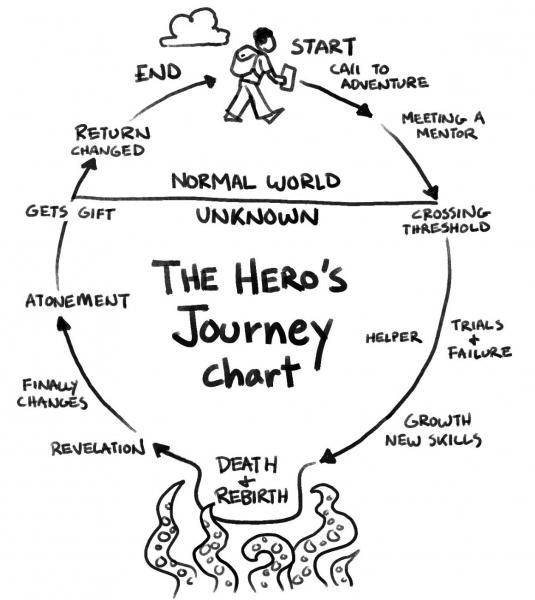
(Image from here.)
Whatever you might think of Joseph Campbell, in a very meta way, universal awareness of Campbell's monomyth has essentially permeated the writing of every modern hero character. (We can argue that the hero's journey never consciously existed for the original writers of mythology, but we can't argue that it doesn't exist for the writers of hero characters today.)
Phainon's arc clearly, step-for-step, maps to the hero's journey, likely in a very intentional way so that the devs can play with the notion of the thin line between hero and villain, the burden of heroism as the conduit for resentment and violence, etc. etc. In light of the fact that Phainon's case so closely maps to the monomyth, it is near inevitable that we see him experience the call to adventure (Flame Reaver's attack) and leave his "known world" (Aedes Elysiae) to pursue the saving of their planet, a conflict which will inevitably push him beyond the brink of death and into apotheosis as an ascended being, a changed man.
But then the hero is supposed to return. Whether or not Phainon's return to normalcy is possible as a changed man, we're supposed to see him try. His journey is meant to be rewarded, his lessons are meant to be learned, and he should be able to go back to the place he calls home, having achieved all he needed to in life.
Aragorn ascends the throne of Gondor with Arwen. Rose Dawson returns the Heart of the Sea to Jack. Odysseus is reunited with his Penelope.
The return Phainon is supposed to long for, the place he is supposed to envision as his normal world, his home, his reward for a journey finally fulfilled... It should be Aedes Elysiae.
But this trailer tells us it's not.
Okhema is the home Phainon dreams of returning to.
Mydei is the person Phainon dreams of being reunited with.
This wasn't a necessary message to send. The devs did not have to link Phainon's individual heroic character arc, the conclusion of the thematic evolution of his character, to another man.
No matter what happens in 3.4, nothing will erase this moment in which the Star Rail writers consciously implied that being with Mydeimos is the end that Phainon would choose for his own journey, the future he would write for himself.
And all of this is improved by the knowledge that Phainon has faced this question about his dreams before. In 3.3, Anaxa asks him this same thing. But when Phainon answers:

Anaxa scolds him for the paleness of the answer, how generic and passionless it is to wish to protect people without even being able to name who you wish to protect:

Phainon's trailer, then, becomes the wham line to this wind-up, the parallel story structure returning to a focal, character-defining moment: Anaxa isn't asking Phainon to voice a practical answer to his query--he's asking Phainon a core question about Phainon's self-identity.
In the past, Phainon was unable to communicate a specific wish or vision for his future because he had no true attachment to the world. He wants to "protect the people he cares about" but isn't able to articulate who that even is anymore, or why he cares about them, how deeply, or what they mean in his life.
In Phainon's trailer, Castorice wishes for a "normal life," and Phainon says "That's not a wish" because it should be hers by right, it should be a given.

In 3.3, Phainon says "I don't want to lose anyone else," and Anaxa effectively says "That's not a wish" because it should be a given, because caring about everyone and placing the weight of their lives on your own shoulders ("being a hero") is a perpetual losing game--it's the same as not actually being able to freely live at all.
So Phainon's trailer becomes an echo. Phainon gets a second chance to answer Anaxa's question, a second chance to tell the world what truly matters to him.
He gets a second chance to show us players what he really wants to protect, not in a vague and detail-less single sentence but with color, life, and specificity.
He still isn't able to say the words, he still doesn't manage to articulate his answer, but we get to see it, nonetheless--the fact that Phainon does have something he longs to possess just for himself: a personal wish for happiness that requires another man to fulfill.
That's how you queer-code a male character, my friends.
723 notes
·
View notes
Note
Please do elaborate on Kaeya and Diluc's fanon! Your post on Kaeya and Venti was amazing to read.
First, before any Diluc lovers come out of the woodwork trying to defend their favorite from me, I gotta place my disclaimer: I am also a Diluc lover; he is definitely in my top three favorite Mondstadt characters (after Venti who is my favorite archon and Kaeya who is one of my favorite Genshin characters in general). So as I make this post, please just keep in mind that I also love and respect Diluc and his role in the story; recognizing a character's flaws and mistakes isn't a personal attack, mmmkayy?
All right, so anyway...

When it comes to Diluc and Kaeya's shattered relationship (personally I view them as strictly brothers, but I can also stay in my own lane, so there is no ship hate intended by this post), everyone talks about the damage Diluc supposedly did to Kaeya's eye and focuses on their duel on the night of Crepus's death.
People are quick to forgive Diluc because he had an obvious reason to be completely overwhelmed; having just lost his father, Kaeya's timing of coming clean about his secret was absolutely abysmal. If Kaeya had managed to wait even one day, the situation might have been very different, so I don't think there's any particular surprise that Diluc ended up attacking his brother, and I think this is where fanon takes on Diluc and Kaeya tend to focus--that Diluc had an warranted emotional response on the night of his father's death and lashed out, and Kaeya has mostly his own terrible sense of timing to blame for what occurred.
Therefore, the fanon approach to Diluc and Kaeya seems to be largely that both of them owe each other reconciliation and that, if they want to mend their relationship, both of them need to put in equal amounts of work.
But personally, I think this is neglecting two glaring aspects of the canon material we're given:
Kaeya's physical injury (if there even actually is one) is absolutely minuscule in comparison to the emotional damage Diluc's attack did. Even years later, Kaeya is not okay.
The diametrically opposed ways that Kaeya and Diluc understand and react to the people around them make Diluc's methods of atoning for his behavior virtually incompatible with what Kaeya emotionally needs from his brother.
I am not downplaying the incredible pain that Diluc would have gone through, having to mercy kill his own father after barely surviving a brutal attack thanks only to his father's sacrifice. To then learn, on top of that, that the brother you had loved, who had been an accepted and trusted member of your family for years, was actually a foreign entity planted in your country with the possibility of becoming a sleeper agent for the enemy--this is beyond the pale of what any normal person could accept. Diluc's anger, pain, and desire to lash out are understandable, and turning on his brother in that moment was essentially inevitable.
However, what people neglect is that Kaeya told Diluc the truth in that moment explicitly because of guilt.

Kaeya felt that his own reaction to Crepus's death wasn't appropriate (he felt liberated by Crepus's loss because it resolved Kaeya of the pain of making the choice between his blood father and his adoptive father) and he was trying to immediately atone for his perceived selfishness by being honest. Kaeya believed that telling Diluc the truth in that moment was better than continuing to perpetuate another lie for the person who had just had to confront his father's likely lifelong deception with the Delusion.
By baring himself completely, being honest for the first time in all his years in Mondstadt, Kaeya thought he was doing the right thing--even though he knew it would cost him his relationship with Diluc.

Diluc repaid Kaeya's honesty with rejection, and Kaeya viewed this as a deserved punishment.
Kaeya's confession was effectively a form of self-harm. He was disgusted with himself because he perceived his complicated feelings over Crepus's death as insufficient grief--Diluc had just lost the most meaningful thing in the world to him, and so Kaeya wanted to "make it right" by losing what meant the most to him too. It was self-sabotage of the highest caliber, provoking Diluc into attacking him because that's what Kaeya thought a liar like himself deserved.
But even though Kaeya knew what the outcome would be, it's clear that he did not understand the extent to which he would internalize the messages he learned that day:
No one should put their faith in me, because I will eventually betray everyone who cares.
and
If I tell the truth, I will lose everything I have.
We're told that, as children, Diluc and Kaeya were thick as thieves, but that Diluc was the extroverted and outgoing one, while Kaeya stuck "in his brother's shadow."

Stories from their childhood reveal that Diluc was the troublemaker who dragged Kaeya into his antics. Kaeya's hangout confirms that Kaeya was a quiet, well-behaved child (it's possible he feared that acting out would cost him his place in Mondstadt) and that his people-pleasing tendencies were already firmly in place, if the stories Adeline has to tell are anything to go by.

And yet the Kaeya of the present is described as shifty, deliberately untrustworthy, and even the type to put others in danger to suit his own ends, refusing the trust of even those closest to him:

It's obvious that there's intentionality behind this behavior--a double-edged blade: Kaeya successfully deceives everyone around him about his actual past, blinding people from asking the hard questions with flashiness and diversions on the surface--and yet he also cannot bear to be trusted. He has internalized the impression of himself as a liar and a betrayer so deeply that he actively repels others' attempts to get closer to him, acting shady and unreliable to introduce doubt into every relationship he forms, so that when the inevitable happens and his secret is finally revealed to the world at large (as it was once revealed to Diluc), he won't face the same pain of loss again.
Kaeya cannot betray anyone ever again if no one ever trusts him to begin with.
Thus, Diluc's reaction to Kaeya's reveal didn't just cost Kaeya his relationship with Diluc. It effectively cost Kaeya his relationships with everyone.
Kaeya went from being a quiet, well-loved child to the kind of person who would smirk while putting his own men in danger, the kind of person who every single other character in Mondstadt (and even the Traveler!) calls a "mystery" whose words can't ever be trusted:
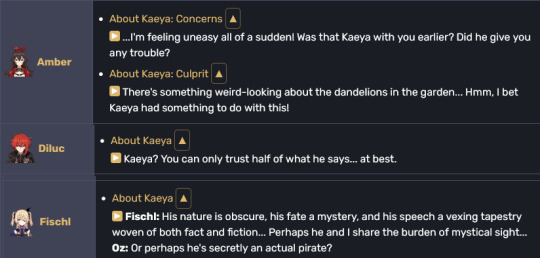
The people of Mondstadt, particularly his fellow knights, clearly love Kaeya; they want to be close to him. The archon of Mondstadt clearly loves Kaeya. But Kaeya's self-image is so horrifically warped by the fact that he revealed the truth of himself one time (just one time!) and immediately lost everything he loved because of that truth, that he has become incapable of letting anyone close again, sabotaging all his relationships in advance before the people on the other side can figure out that he's not who he claims to be.
Because of how Diluc reacted, Kaeya has subconsciously drawn a connection between honesty and pain: So long as Kaeya hides who he is, he can be accepted and tolerated in Mondstadt. But if he dares to reveal the truth, he will be met with violence and outrage.
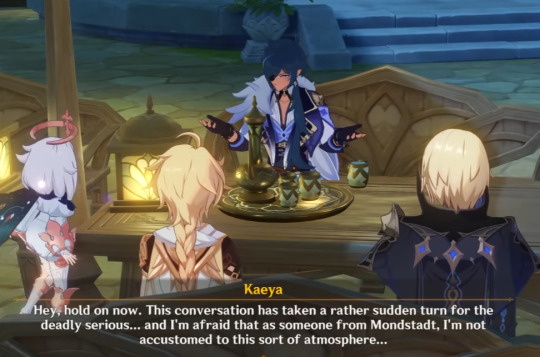
Thus, Kaeya has resigned himself to a literal "lifetime of lies," a "never-ending performance" in which he can never be honest with those around him--even while other characters like Albedo cruise through life with seemingly no care that people know their Khaenri'ahn connections.
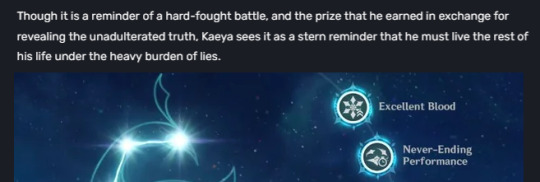
This is why "acting" is so prominent a theme in Kaeya's character, both in the past and present, why we constantly see him "playing a role" (as a prince, as a bandit, as a hero, etc. etc.)--he is never the real person, always a performer, and it is often only through his performances that he's able to express some of his own true thoughts and feelings, masking himself behind someone else's script as a way to "safely" express the tiniest hints of his own truth.

What happened with Diluc fucked Kaeya up bad, in the most basic of terms.
Because the problem is: Kaeya doesn't want to be the way he is. He clearly loves the people of Mondstadt with everything he has. He adores Klee, greatly respects Jean, and has an incredible desire to protect the city that took him in. He wants to be close to others. He wants to reconnect with Diluc. He's a desperately lonely character who practically begs the Traveler to spend time with him and reacts surprisingly harshly when the idea of his being lonely is dragged into the light.

I'd even go so far as to argue that his legitimate issues with alcohol stem from the fact that the taverns of Mondstadt are the one place where he is guaranteed to find company, where no matter what time of the night, he is sure to find someone--even if it's just bandits and treasure hunters--to fill the silence.
Because of his past experience, Kaeya can neither be honest with others nor comfortable with lying to them, constantly forced to keep others at arm's length to avoid the painful possibility of further rejection for just being himself. What happened the night of Crepus's death essentially shut Kaeya out of any healthy adult relationships, leaving him entirely alone even in the middle of a city full of people who want to love him.
(This is why it's so important to me that Dainsleif already knows all of Kaeya's background, even the parts Kaeya is still keeping quiet about--but that's just the DainKae shipper in me jumping out, so I'll move on lolol.)
While grappling with the very real fear of his own future, of knowing that his destiny will catch up with him--but wracked with the uncertainty of not knowing where and how--while struggling with his divided allegiances, while just trying to figure out where his own place in the world even is, Kaeya is entirely alone, trapped on the sidelines of his own life in no small part because he took the risk of being himself one time and it cost him everything he loved.

And this is where I think fanon struggles, because it's much easier to just say that Kaeya is dishonest by nature, that he was always going to be a deceptive character, or that the worst outcome of his duel with Diluc was the scar on his face. There's this ridiculous notion that Diluc is already done atoning for that physical wound...
But the scar on Kaeya's face (if there even really is one) is utterly meaningless. The reason Kaeya won't take off his eyepatch has nothing to do with his appearance. He won't take off that eyepatch because it's symbolic of his fear of revealing himself. Kaeya's eyes are synonymous with his identity as a Khaenri'ahn, and thus his refusal to reveal his other eye is nothing more than a visual indication of his discomfort with himself, his divided loyalty, and his internalized belief that the cost of revealing himself fully will be the thing he most cares about: his home in Mondstadt.
Kaeya's entire personality, his sense of self-worth--his life--was reshaped on the night he dueled with Diluc.
And this is the tragedy, of course: Diluc's actions were understandable. Even Kaeya knew Diluc's lashing out was inevitable. It's not like we can really say "This is your fault, Diluc." But the fact of the matter does remain: If Diluc had only managed to control his emotions just a little bit better, if he had only been able to stop himself for a moment to think about his brother as a person who was also hurting and fraught in that moment, he might have realized the emotional significance of Kaeya revealing who he truly was. If Diluc had accepted--or even just tolerated--Kaeya's truth, Kaeya's entire adult life would be different, and that's just a basic fact.
Diluc has his own flaws though! He has his own crosses to bear that made it impossible--that I think, to a certain extent still make it impossible--for him to understand the damage he did and can still do to Kaeya.
So this whole fanon notion of them being on a reasonable path to reconciliation, that they'll be able to resolve their past disagreements by meeting each other in the middle... I just don't think that's really all that accurate to canon. I don't mean that they're not working toward reconciliation or that they won't get there eventually, but that the notion of "reconciliation" in the first place is entirely tangled up with Kaeya's sense of self-identity, and until he is able to resolve the truth of his past and his lingering loyalties to Khaenri'ah, I don't think he'll ever be able to fully repair the relationship that was lost between himself and Diluc.
And to be honest, this is just my personal view of the situation, but... I find it particularly hard to stomach the idea that Kaeya should be the primary driver of repairing the relationship between himself and Diluc, which I've seen in a lot of fanon takes (perhaps because fans in general agree that Diluc is a lot less likely to take action in an emotional situation than he is when fighting monsters lol).
I don't believe Kaeya really thinks it's possible for him to fully reconcile with Diluc. Kaeya cannot apologize for his existence, for being Khaenri'ahn--he cannot change who he is. He cannot "undo" his revealing the truth or make the reality of his double life go away. Thus, in Kaeya's eyes, he effectively has no way to make himself "acceptable" to Diluc again. This is why he continues to shy away from Diluc, even all the way to the recent archon quest, where he tries to excuse himself immediately, claiming that they'd just get in each other's way:
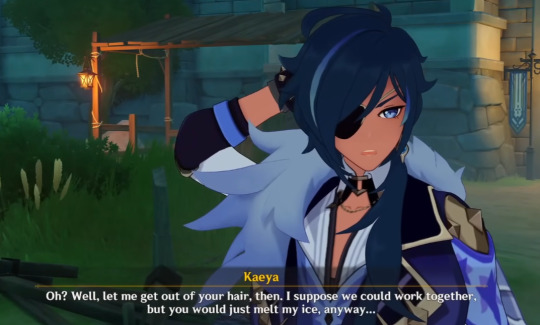
It's why he behaves like a thief sneaking into the Dawn Winery and repeatedly calls himself nothing more than a "guest" in the house, even though Adeline and the other employees pointedly tell him it's still his home and he's still welcome.
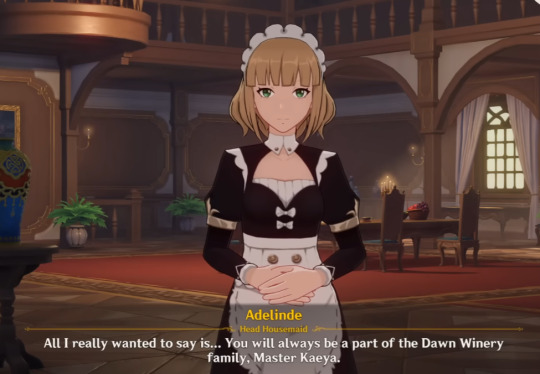
It's why, despite continually doing things to show he still cares--keeping Diluc's Vision safe, sending letters while Diluc was away--Kaeya isn't even brave enough to call Diluc his brother to his face anymore.

Kaeya cannot "fix" what happened between himself and Diluc, and his own image and sense of worth have been so shattered by what is now years of internalized self-doubt and self-imposed isolation that he seems afraid to even genuinely expect anything of Diluc at all, let alone consider the possibility that Diluc might owe him an apology instead.
Diluc knows he does, though.
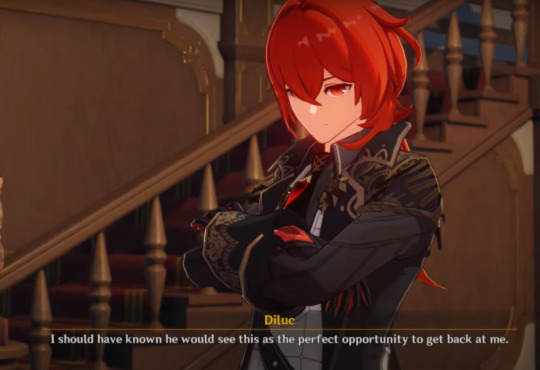
He just can't give it because of who he is.
This is, I think, the most frustrating--but also most realistic and best written!--part of Diluc and Kaeya's relationship: Diluc clearly does want to atone for what happened the night Crepus died. He is doing many things, in his own Diluc-ish way, to signal to Kaeya that he wants to put the past behind them and restore their relationship.
He kept and displays the vase Kaeya hid his Vision in (despite it being garish on purpose); he also keeps the lantern Kaeya brings him from Sumeru in Kaeya's hangout.
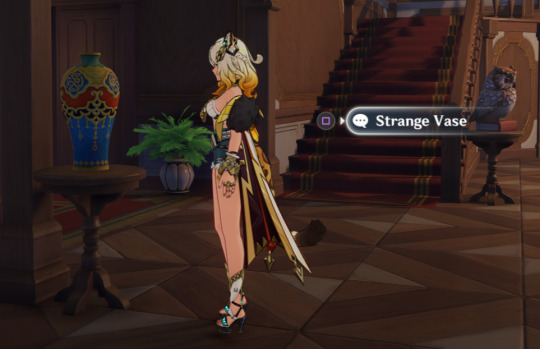
He responded to Kaeya's letters during his absence from Mondstadt. He allows Kaeya into the Dawn Winery, with the implication that the doors were always open for him in the first place.
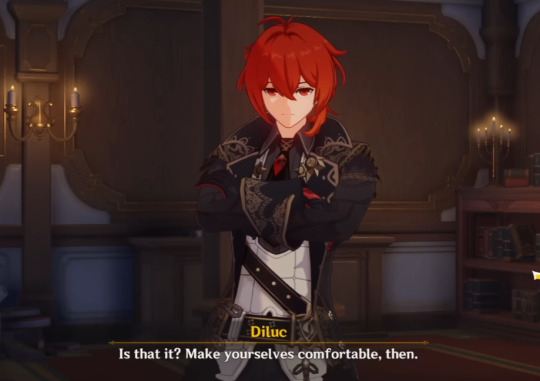
When Kaeya tries to leave during the most recent archon quest, Diluc essentially makes it clear that there's no reason why they shouldn't stay together.

Showing a picture of Diluc's in-game model feels like character assassination at this point...
Although Diluc can be prickly and doesn't always have the nicest of things to say about Kaeya to others, it's pretty clear that he isn't intentionally holding a personal grudge. For the most part, it comes across as if Diluc seems set on quietly putting aside their past--as if it didn't happen.
This is, effectively, an apology without actually speaking one: If Diluc allows Kaeya back into his life, acts as if Kaeya is making a big deal out of nothing (like when he told Kaeya to quit guilting him over the eye injury), and implies that Kaeya still belongs in the Winery family, at the Angel's Share, etc., then isn't he doing the right thing? Isn't he showing Kaeya that he does accept him as he is? That he knows who Kaeya really is and still can tolerate him?
You can almost feel the thought process: Do I really have to spell it out?
But the problem is that Kaeya's sense of self-worth is so crippled by his internal perceptions--I'm a liar, I have and will continue to betray my loved ones, I'm not meant to be here--that Diluc's presumptuous and silent form of reconciliation is essentially incompatible with what Kaeya actually needs to hear and experience. Kaeya does, in fact, need it spelled out. In glaring red letters. And then probably fifteen more times for good measure before he'll actually start to let himself believe it.
Over and over and over again, people reassure Kaeya of his place in Mondstadt and in the Dawn Winery family specifically:
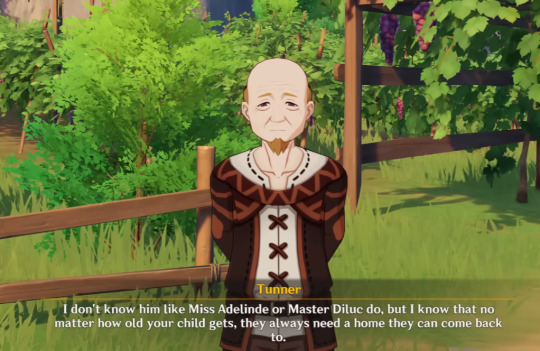
But over and over again, Kaeya dodges and dismisses their reassurances, because until he believes Diluc has forgiven and accepted him, he will never feel confident in his place in the Ragnvindr family (and by extension, Mondstadt) again. Even though Kaeya has visual proof of Diluc's continuing care--the vase in the lobby of the winery--he doesn't dare to make any major assumption. He isn't confident enough to take Diluc's string of small gestures for actual, meaningful acceptance.
Despite how obviously Kaeya wants to be Diluc's brother again--the moment at the end of the recent archon quest is the most joyously animated we've seen Kaeya in a long time--
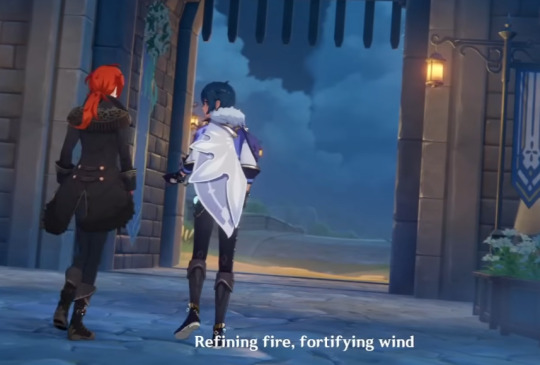
--their reconciliation is effectively doomed to continue at a glacial pace because of who they are as people.
Diluc's method of handling the emotional issues in his life is critically avoidant, while Kaeya desperately needs direct and unambiguous confirmation that he cannot rationalize away.
Until both of them are able to confront the heart of the matter--which is Kaeya's identity and Diluc's explicit acceptance thereof (Kaeya's explicit acceptance thereof!)--they will continue to make minuscule progress as Diluc lets his gestures, rather than his words, speak on his desire for reconciliation, and Kaeya tentatively toes the line and then retreats, two steps backward for one step forward.
It's my personal belief that we'll likely see a "real" reconciliation between Diluc and Kaeya only when Kaeya is able to finally reconcile with himself.
But Diluc could fix this problem at any time, if he wasn't, you know... Diluc. 😂
Anyway, all this to say that I think fanon really favors Diluc over Kaeya in a lot of cases and that there's a critical lack of reflection on the long-lasting and very serious effects that their falling out had on Kaeya's emotional and mental state.
It's not about the duel, it's not about the eye scar--it's about Kaeya becoming convinced that his entire life must, by necessity, remain a lie forever, crystalizing his belief that he can never feel comfortable in his own skin.
He was already struggling and uncertain about his dual allegiances, but to take the risk of revealing himself to someone he loved only to face immediate and violent rejection... Kaeya knew it was coming and it still messed him up a lot, a lot more than people seem interested in talking about.
Just sayin'.
466 notes
·
View notes
Text

‘sorry it took me so long…’
93 notes
·
View notes
Text
”kevin” this “khaos” that
his real name is clearly Yearnmaster 3000
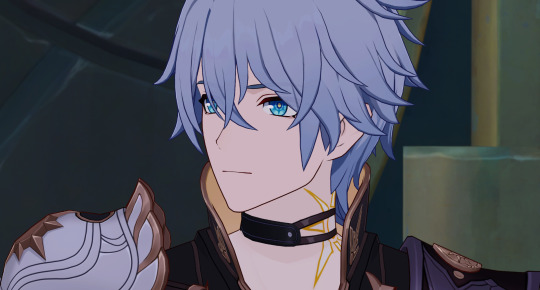
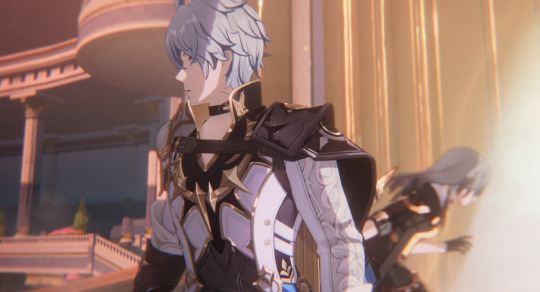




3K notes
·
View notes
Text
absolutely losing my mind because of these two!!!
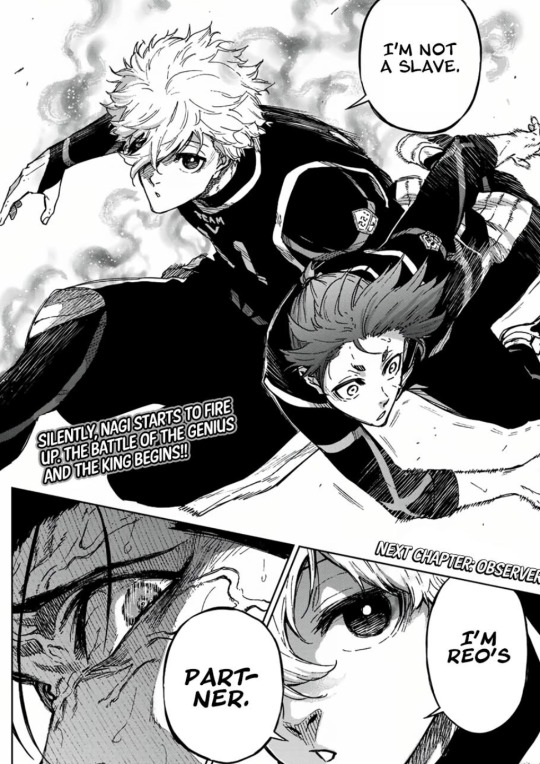
so.
are these two actually toxic, or are they just kids who don't know how to communicate? easy, they're just kids! (this was fast)
reading the manga will not make you understand that (or im just stupid), and this is why I'm thanking the author on.my.knees for the spin-off!
so.
after watching the anime I fled to ao3, of course. read some works about Rin and Isagi, managed to not spoil myself anything.
then i read the U20 arc. after reading every ryusae I could find (writing one myself rn, doing god's work) I finished to read the manga cause, yk, I wanted to know what would happen with my babies and then boom! Reo and Nagi!!!
I didn't particularly care about them at first: Nagi was strong ofc, but kind of boring? he's not my favourite archetype, and while I loved Reo I hated their fight and wanted nothing to do with them. key word(s), at first.
then, then! I randomly read some fics about them cause they'd started to grow on me, and boom, tons of fics about their breakup/makeup. stunning works, ofc, but I started to see so many "Reo's fault" "Nagi's fault" "toxic relationship" that I kind of started to get uncomfortable (sometimes people throw around the word toxic when it's nothing like that), so what's to do? read the spin off ofc.
that I did, and now not only I love them both with all of my heart, but I'm Reo's number one fan (and kinnie)!
and I developed a deep hatred for those "toxic x" theories and takes. SO. let me blabber and rant.
they love each other so much!!
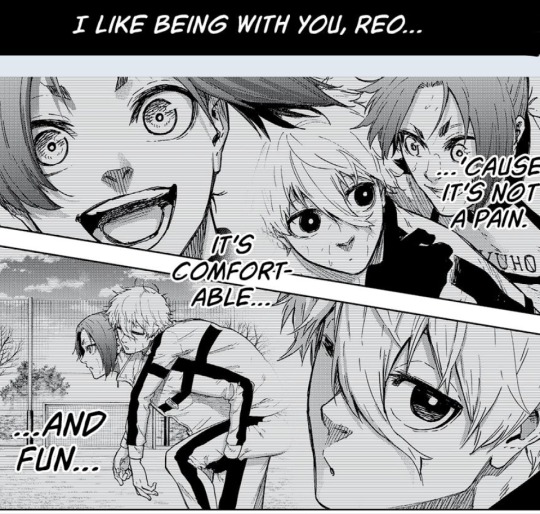
this is Nagi.
he thinks "damn, soccer/football is a pain, I hate sweating and running, but I don't hate Reo" even though most of the time he spends with Reo is spent playing soccer/football (I won't choose one english is so confusing- in italian it's literally called kick).
he doesn't feel forced to be Reo's friend, he likes it.
because Reo loves him, it's as simple as that.
he wants to be Nagi's friend "despite" Nagi's personality: this is something he currently says through the spin-off, which made me cry- Reo truly is the first person who ever accepted Nagi as someone who is lazy and unmotivated, who complains a lot, who doesn't put any effort in what he does, who doesn't offer much.
Or at least he thinks that he doesn't have anything special to offer, until Reo arrives.
he still has those terribly self-deprecating thoughts, but now he has something to offer, his talent.
(and after a period of happiness, their honeymoon phase one could call it, he starts to doubt the sincerity of Reo's care. from thinking "i'm not his slave, i'm his partner" he starts to doubt Reo's honesty: "maybe he only wanted to be my friend because of my talent, a talent he knows how to use"- since he still thinks that he's got nothing to offer! but we will talk about this later.)
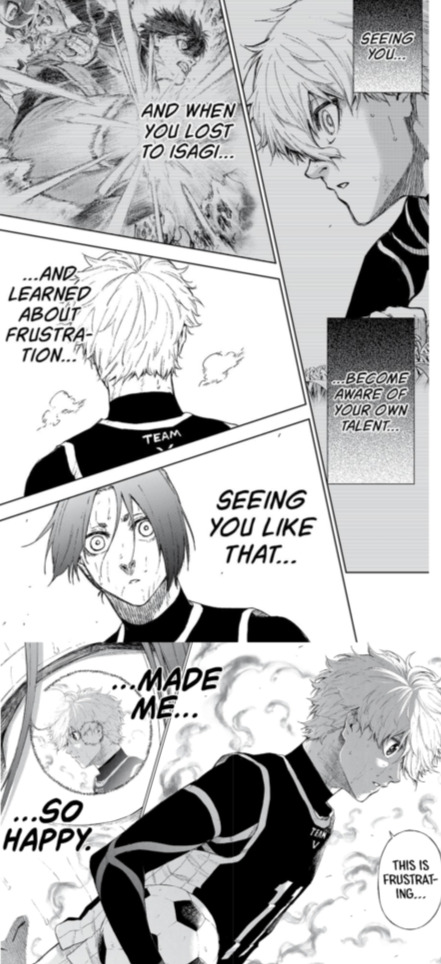
this is Reo!
he thinks "I wanted to be the one who could make you love soccer/football, the one able to light up something in you" but he also thinks "seeing you like that, even if it wasn't me who'd done that, made me happy".
he's so jealous he's almost funny, and isn't that the most teenager thing ever?
who wouldn't be jealous after working so hard to be special to someone, just for someone else to take the place you're working so hard for?
it's terrible, but still, it doesn't stop Reo from being happy that Nagi found something exciting.
something that made Nagi as happy as the combo Nagi-soccer/football made Reo happy.
the thing is, Nagi thinks he's Reo's friend because of his talent, which maybe it's true. maybe, hadn't Nagi been a genius, they wouldn't have become friends, but his talent was the sparkle that made him become Reo's treasure.
Reo is someone who has everything, who gets everything he wants, or as he says everything except what he really wants.
for that, he has to work.
so, what he wants is to play soccer/football, and to play it with Nagi.
(in order to be Nagi's friend, he needs to work hard, because he needs to be honest and gain Nagi's trust- this is how friendship works: even when it seems flawless and easy, there's so much work behind it, and knowing it is important. most of the times we only realise it once we lost that bond- for example, Nagi. Reo already knew it, and this is why he tried so hard to not leave Nagi's side)
at one point, the two things became linked to one another, and his dream turns into "winning with Nagi, my partner". Because Nagi is talented, is special, and Reo saw his talent, and how Nagi was unable to do the same. He wants to show Nagi that soccer/football is fun, that his talent isn't a pain, that he is special, because Nagi doesn't know it, and for Reo a star that doesn't see his its own light? is just preposterous.
He cares for Nagi and loves everything about him, even all the "bad" things, and he doesn't think that Nagi has to change, and this is what, for me, makes their break-up way more serious and relatable for a lot of people.
it triggers a "I'll change to be better" "for me you never had to change" "I need to change for myself" dynamic.
2. changing and longing is way more fun when you're doing it together!!!
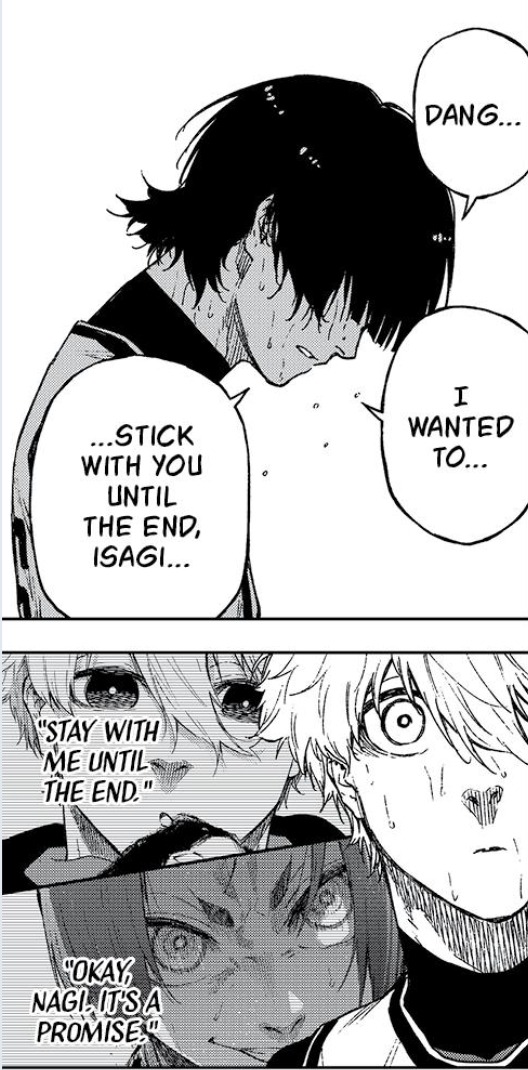
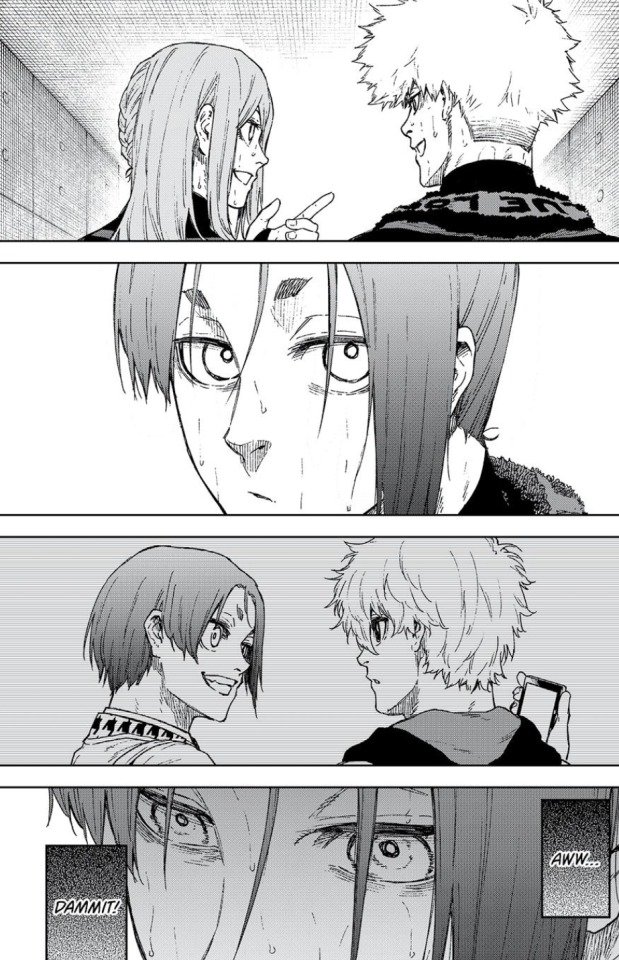
so they split up.
Nagi doesn't do it because he likes Isagi more, or because his style of play is more interesting, he does it because Isagi was stronger than Nagi and Reo: entering Blue Lock, Nagi had trust in Reo's ability to use his talent to win, he didn't even think about failing, and while Barou came close to making him feel like he could loose, Nagi overpowered him at the end- but then Isagi beats Nagi, and Reo with him.
Nagi understands that Reo's dream can't become reality if they aren't the strongest, and if being together doesn't work, maybe they should split up, part ways, become stronger and then join forces again, and win everything. win the world cup.
while his friendship with Isagi is sweet and I love them, for Nagi Isagi is like a cyclette.
he'll use the cyclette to get get fit and make his bf swoon over his legs, he won't stay with the cyclette once he doesn't need the training anymore. and even if he will, it will always be just the cyclette he uses to get fit "for" his bf.
(metaphor isn't metaphoring)
Reo doesn't know that.
he knows he's strong, but he knows that Isagi and Nagi are on a whole other level and he feels threatened. he fears that Nagi will choose Isagi instead of him, and he tries desperately to not loose Nagi.
Nagi is his dream. Slowly, day after day, Nagi became part of his dream, and now he's losing not only his best friend but the dream that made him free.
Reo says it himself- he knows that Nagi did the smartest thing by leaving, but he's young and scared and sees it as Nagi leaving him.
He feels abandoned, and he thinks that Nagi is abandoning his dream to go with the bigger fish, the apex predator, in order to become the best striker, by forgetting the promises they made at the start of Blue Lock, to stay together til the end.
Neither of them forgets the other.
Nagi leaves, and all he thinks about it "I need Reo to see this" "I can't wait to let him see how much I've improved", and he misses Reo, just as much as Reo misses him.
the only difference?
Reo is oblivious about Nagi's real feelings and thought process, and his thinking of Nagi turns into spiraling into depression and self-hatred.
so Nagi changes.
he starts to see the beauty in soccer/football, he finally sees what Reo had tried to make him see for months, and he's thrilled. he's having fun. he's grateful that Reo convinced him to not discard Blue Lock immediately. he's different.
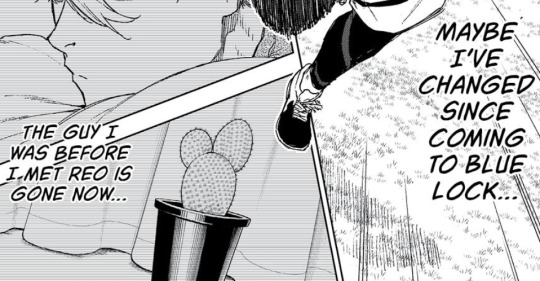
different why? because Isagi beat him? because Blue Lock happened?
he changed not when Isagi beat them, but the moment he became Reo's friend, and found a reason to do something.
because Reo was the first person to ever tell him that his laziness, boredom, his oh so troublesome antics were alright, that he was what he was, and he was enough not only for Reo, but for the whole world.
Reo accepted him even when he was set on being static, made him want to change, and now that he's changing he feels worthy of being loved so much.
"you saw something in me back then, you forced to me work hard, and now thanks to you I ('m on my way to) realised my own worth, now I found something exciting"
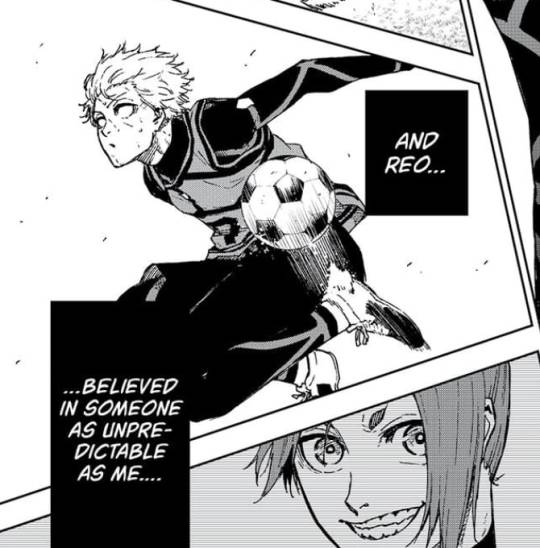
he changes.
Reo sees him after what, a few days, and he's already improved so much.
and he thinks that he was Nagi's cage, his personal dead weight, that Nagi may have been his treasure but he wasn't Nagi's. that Nagi doesn't need him anymore. if Nagi doesn't need him, what will be of his dream?
(we could start a long-ass post ab mental health and recovering but I won't for my own sanity)
what's his worth then, since he got into Blue Lock just to stay with Nagi till the end- especially when he can't even be number two, with Isagi there- and Nagi won't be with him anymore?
he needs to change too.
3. destroying yourself in order to change (no fun)
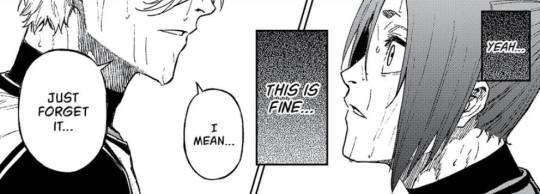
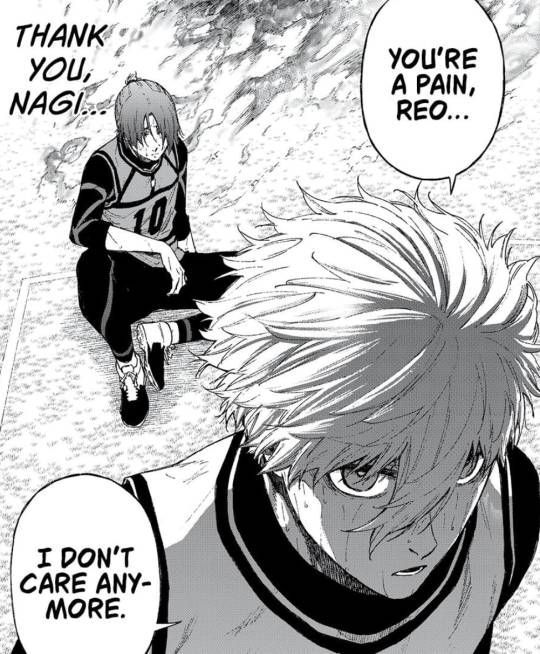
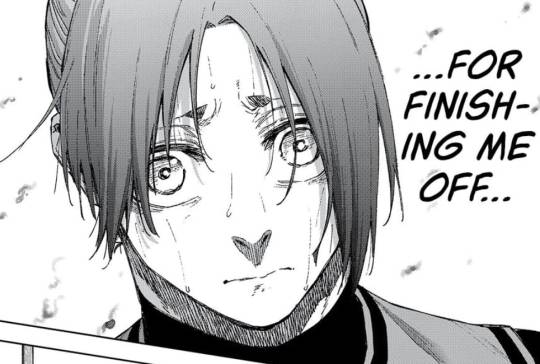
Reo says that he isn't brave enough to destroy himself like the others do.
Isagi, Barou, Nagi, Chigiri, they all destroy themselves in order to become stronger and change, evolve, but Reo can't. he's scared, he's confused, the whole arc is just him looking like that. then what does he do?
he lets Nagi destroy him. "If I can't do it, Nagi will" don't you understand you're doing exactly what you say you're unable to do? the fact that you're not the one pulling the trigger doesn't mean that you're not killing yourself
he pushes Nagi until he snaps and tells Reo to fuck off, that he's a pain, that he's weak and someone Nagi doesn't want anything to do with, because that's what Reo thinks.
He thinks Nagi doesn't want to be with him anymore, he's feeling guilty for what he thought (later later), he's insecure- and instead of being reasonable, he founds a way to confirm his "irrational" fears.
"I'm not being insecure since Nagi confirmed it"
he sabotages himself. that's the nail in the coffin.
instead of destroying himself with football/soccer, by learning from a lost match, he destroys himself with life, by putting on the line his relationship with the person he (not exaggerating) loves most in the world.
he's unable to distinguish life from soccer/football (and this will be the aspect that makes him so different from most of the other characters), because since meeting Nagi they've become one thing. soccer/football is his life, Nagi is his life, because they're his only chance at being happy.
(Nagi is able to distinguish between the court and Reo: this way, Reo is just as special as Isagi is, since Isagi may have made him see the fun in soccer/football, but Reo made him get angry. Nagi who thinks that his strong quality is the fact he never gets angry, that he's a pacifist. Isagi is his soccer/football revolution, Reo is his life revolution.
Reo can't. they all insult each other on the field, but they're all friends afterwards. not Reo. not yet)
now he's lost Nagi, and his dream, and he has to pick himself up from the ground.
this is how Reo changes.
4. miscommunication is a beast

As I said before, Nagi starts to think that Reo only cared about him because of his talent. he's angry at Reo. he doesn't understand why Reo said those things, why he was so stupid, why he didn't understand Nagi.
he says "I'm not his toy" and he isn't, but really, try to get into his shoes.
he thinks his partner, his best friend, doesn't believe in them as a duo anymore, doesn't want to believe in them like he used to now that Nagi has changed, now that he's more "independent" from Reo.
"what, now that I know how to fight alone, he doesn't want me anymore?" that would be anyone's first thought.
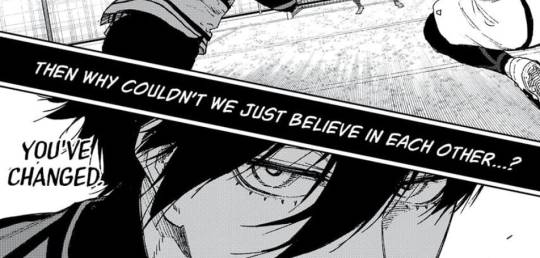
and he doubts Reo's trust in their dream.
when did Reo start to have so little faith in them, in Nagi? when did he give up on them? he thinks that, after spending weeks trying to improve just to make Reo's dream true.
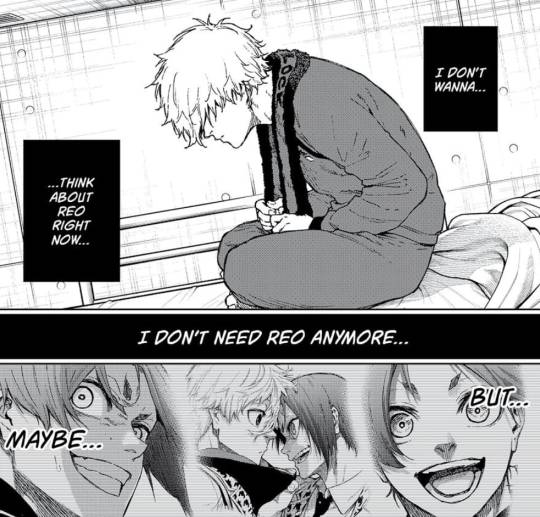
and he's angry, but he still hopes to play with Reo again.
he still want to, because him and Reo are partners and Nagi still believes in their dream. because he remembers Reo's passion, and he believes in him.
+) 5. being relatable as fuck

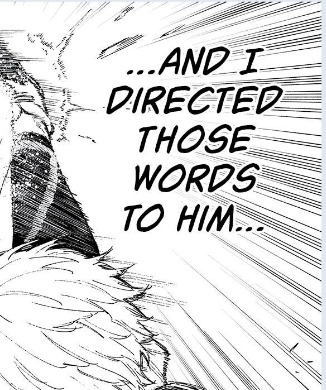
(what kid with absent/abusive parents never thought back on their action and went anxiously all "Am I just like them?")
Reo begs Nagi to stop being so strong, stop improving so quickly, stop running towards a place Reo can't reach yet, and isn't this a human thing to do? He desperately wants to be with Nagi, and thinks that he'd rather stop him from improving rather than lose him. He thinks "Please, give up on your dream, your ego"- and isn't that familiar?
he just thought the same thing his father, a man he hates and despises and who doesn't believe in Reo, told him. and he said that to Nagi. Nagi who gave him a ticket to the top by being at his side, who let him see hope.
he panics. am I just like him? Am I cruel enough to wish for someone to give up on their dreams, just to get something out of their failure?
he's different from his father, because he's seventeen, he's scared to lose his best friend, and we can be irrational in situations like this one. does he know it? no, the same way he doesn't understand that Nagi didn't left because of him.
so yes, he's in the worst head-space ever.
isn't he relatable? this is what that made reo my favourite character in a second, probably. he's so human and he makes so many mistakes and he's so stupid sometimes, but I can see myself in him very clearly.
and now.
in what way is their relationship not balanced? their love and care not mutual? in what way one used or manipulated the other?
I think they're flawed, and they made mistakes, and they hurt each other, but I also think that we throw in the word "toxic" the moment a relationship isn't perfect.
they're friends and they're teens, they will make mistakes and they will hurt each other, and their friendship (and they were roommates) won't be perfect- this doesn't make it less genuine or beautiful.
don't get me started on what happens in the manga (really don't do it) (all of this was just nagi's spin off!!!)
944 notes
·
View notes
Text









blue lock objectively is insane and probably bad. but the thing about blue lock is that once you watch it youre like holy shit this is peak. its a disease.
other powerpoints ive made (including bllk part 2)
5K notes
·
View notes
Text
Resource Post: Blue Lock Light Novel Translations
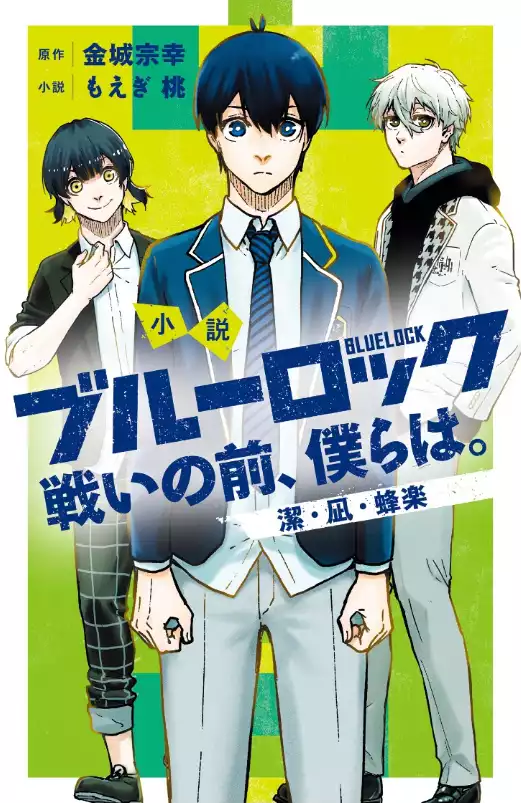
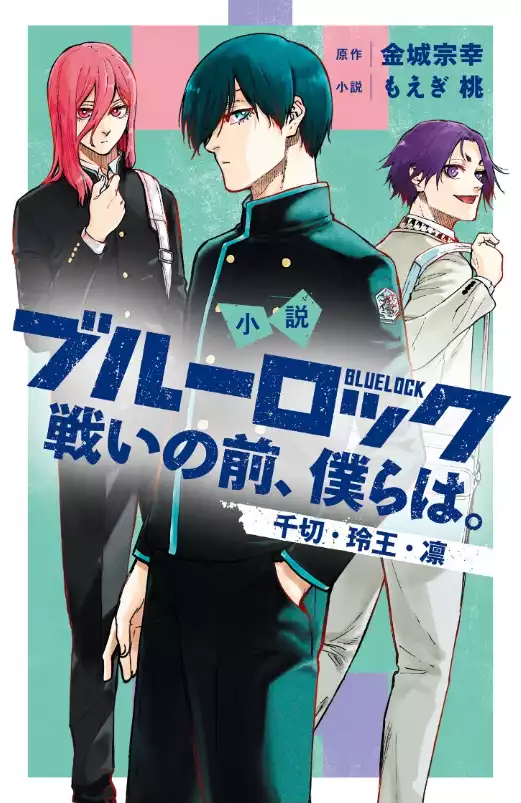
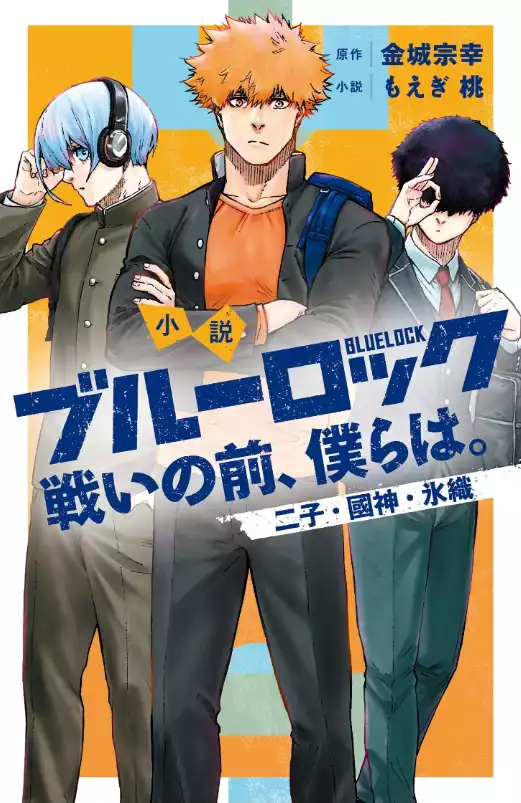
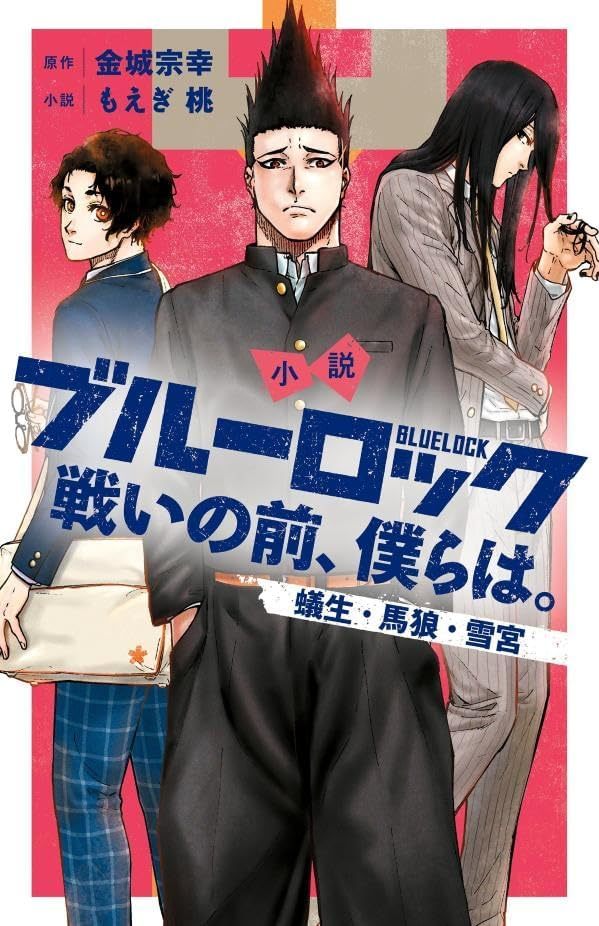
Volume 1: Isagi, Nagi and Bachira
Isagi part 1
Isagi part 2 (translated by Hoshi801_)
Nagi part 1
Nagi part 2 (translated by Hoshi801_)
Nagi (full) (translated by mzk_70)
Bachira part 1
Bachira part 2 (translated by Hoshi801_)
Illustrations (sourced from Hoshi801_ and around the web)
Volume 2: Chigiri, Reo and Rin
Chigiri part 1
Chigiri part 2 (translated by Hoshi801_)
Reo (full) (translated by mzk_70)
Rin part 1
Rin part 2 (translated by Hoshi801_)
Illustrations (sourced from Hoshi801_ and around the web)
Volume 3: Niko, Kunigami and Hiori
Niko (full) (translated by carbunnyra)
Kunigami part 1
Kunigami part 2 (translated by Hoshi801_)
Hiori part 1
Hiori part 2 (translated by Hoshi801_)
Illustrations (sourced from Hoshi801_ and around the web)
Volume 4: Aryu, Barou and Yukimiya
Aryu (untranslated)
Barou (untranslated)
Yukimiya (translated by takeunknownroadnow)
Illustrations (sourced from around the web)
Disclaimer: I do not own Blue Lock or any of its characters. Blue Lock was created by Kaneshiro Muneyuki and Nomura Yusuke. The light novels were written by Moegi Momo. All rights belong to the publisher, Kodansha. These are fan translations of the original Japanese and distributed for entertainment only.
2K notes
·
View notes
Text
Mydei and saving face
Although I have my issues with the storytelling and underutilization of the visual medium in these past patches of HSR, we Phaidei fans have been eating well. I want to focus on this moment in particular:
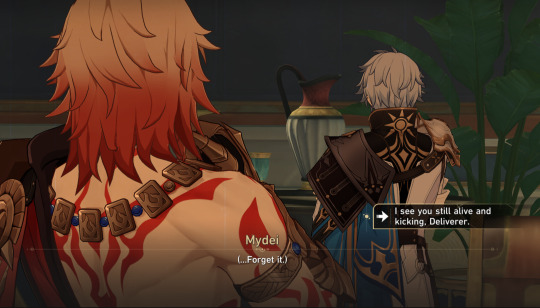
(This post turned into a light linguistic analysis, so I apologise in advance. Disclaimer: The observations only apply to the English localisation since I can't speak for the other languages.)
I love it that they let us into Mydei's head for a while by giving him a bunch of dialogue choices that he can't bring himself to say. He can see that his friend is hurt, he's got enough insight to know why his friend is hurt, and yet he can't address any of that directly. He wants to offer Phainon a chance to talk about the failed trial and is contemplating various approaches, which I'll lay out here.
(1) "How's your recovery coming along, my friend?" (2) "Winning and losing are all part of a warrior's life. Don't let it get to you." (3) "Why don't you take a bath to recharge, buddy?" (4) "Keep your chin up. You have greater things to achieve." (5) "Want to grab a drink with me, pal?" (6) "If you're up for it, let's have a talk."
In terms of pragmatic linguistics, asking Phainon to talk about his recent failure is a face-threatening act. It threatens both his positive face (the desire to be admired and approved of, ie. to be seen as tough and capable) and his negative face (the desire for autonomy, ie. not be forced to talk about something difficult). Mydei is trying to navigate this minefield by finding words that alleviate the threat (aka. save face).
Words like "friend", "buddy" and "pal" can be used to enhance the hearer's positive face (specifically the desire to connect and belong) by emphasising their social closeness to the speaker. Mydei is thinking about using these to soften the face-threatening act of directly asking about Phainon's recovery or asking him to do something (ie. have a bath or grab a drink). Phrases like "why don't you" and "if you're up for it" are also attempts to save the hearer's negative face by forming the request as a suggestion and throwing the ball in Phainon's court. Options 2 and 4 are the most direct and thus threatening, but even they do attempt to enhance Phainon's positive face by defining him as a warrior and expressing faith in his future accomplishments.
The problem is that Mydei's got immense trouble with vulnerability. He has to protect his own positive face, that being the image of a tough Kremnoan prince who bathes in the blood of his enemies. So in the end he can only resort to his usual banter, making an observation and leaving the choice of talking or not talking entirely up to Phainon (hence protecting his negative face). Instead of using friendly but hollow terms of address like "pal", he opts for the semi-sarcastic word "Deliverer", which is ironically probably better at emphasising their shared bond despite its intended bite. Although the utterance "I see you still alive and kicking" threatens Phainon's positive face by implying a chance that he might not have made it, Mydei does manage to break the ice and Phainon eventually opens up to him.
TLDR; This single moment is an incredibly powerful moment of characterisation, and it's achieved through dialogue options, not even dialogue itself. Sometimes less yapping drives the point home much better than paragraphs of exposition. God I wish they were consistent with it.
238 notes
·
View notes
